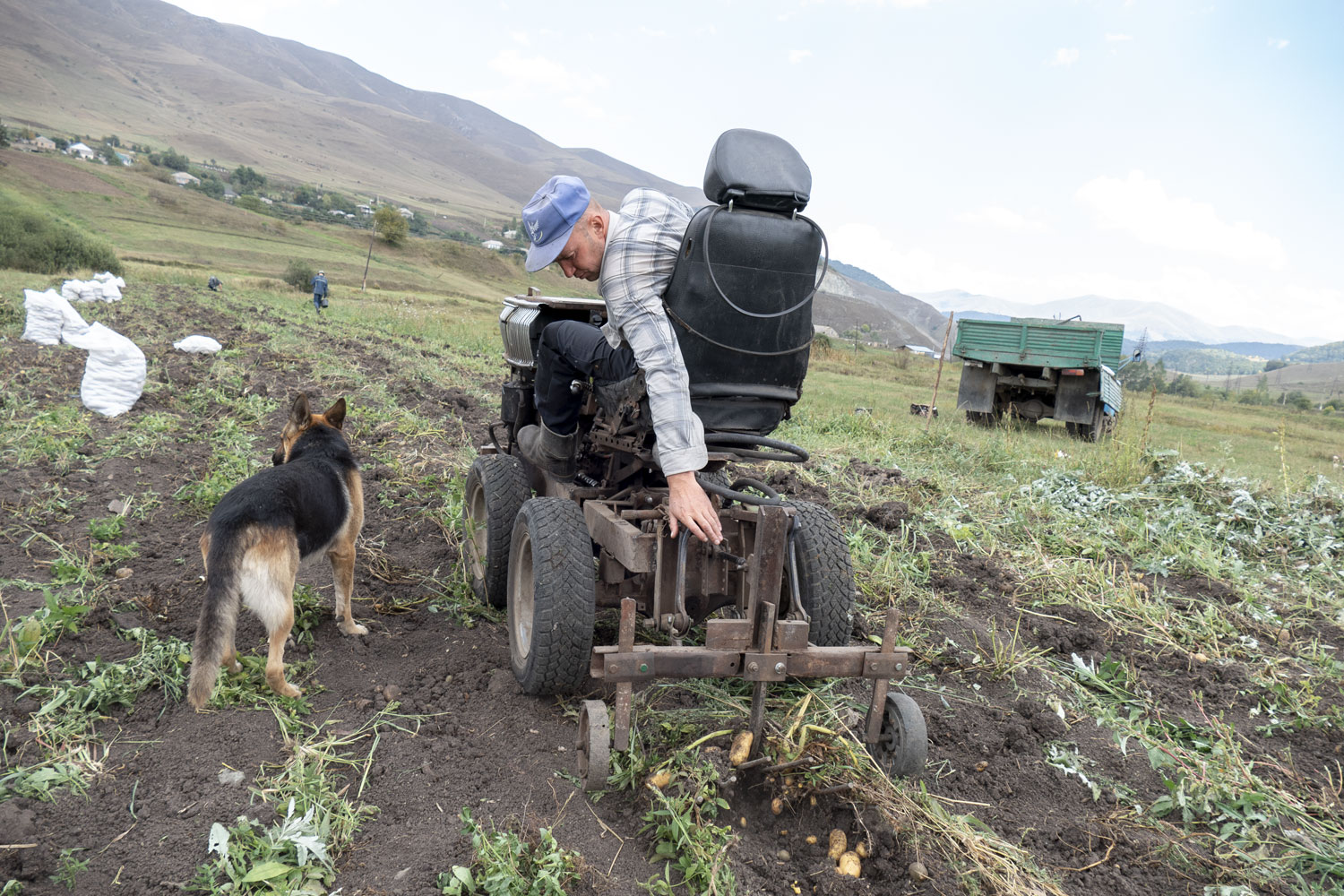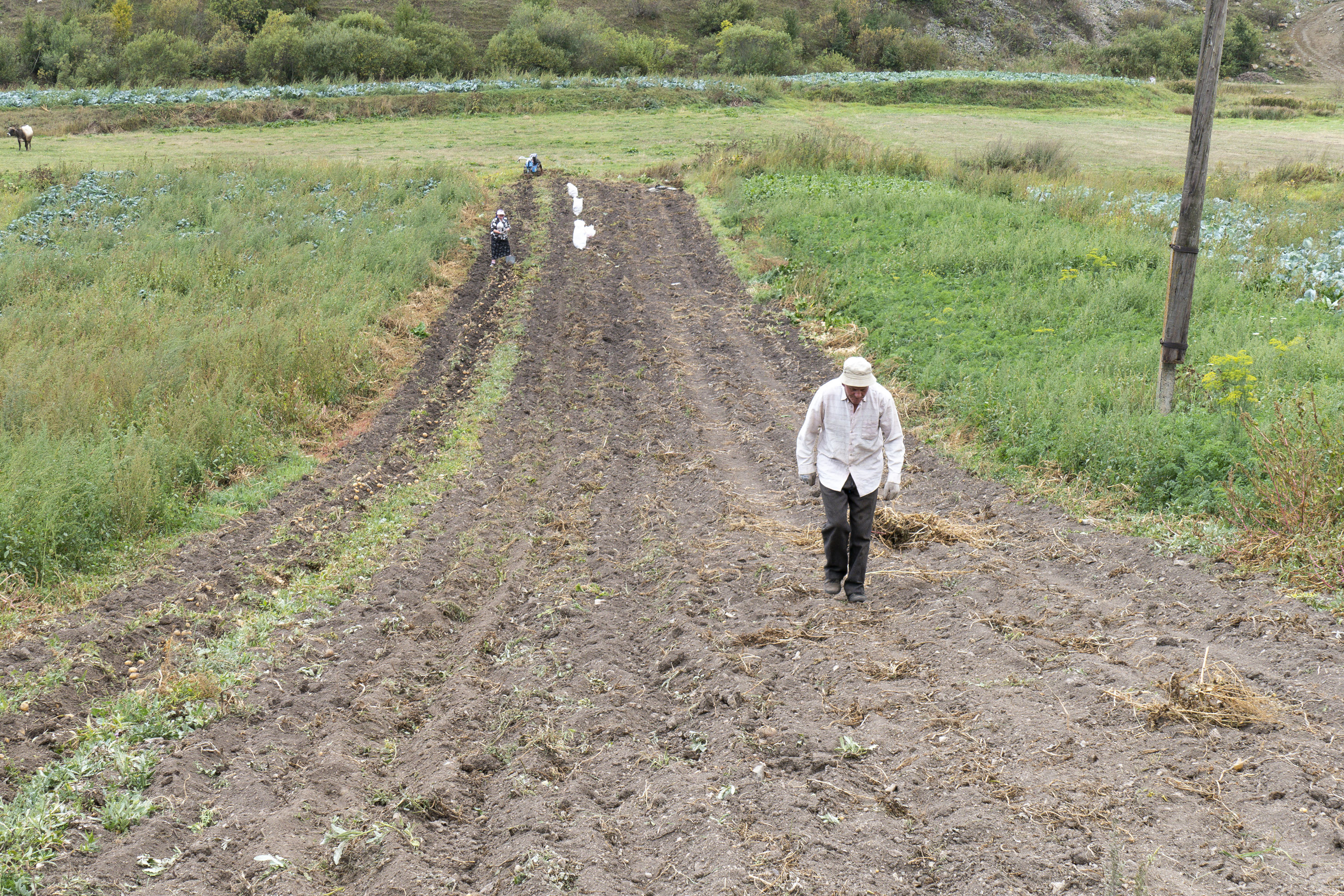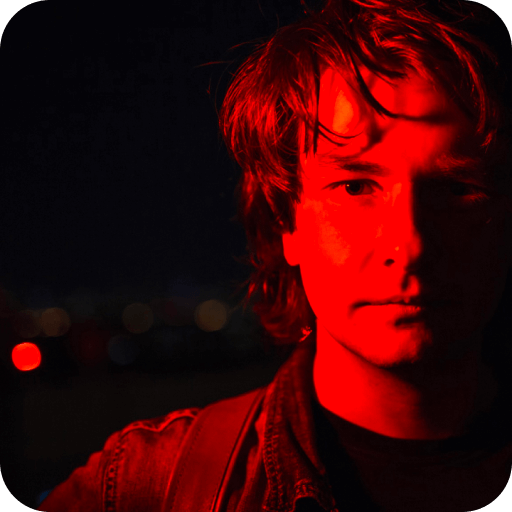Molokans
Along the small highway that runs through local hills and fields, halfway between Dilijan and Vanadzor, there is a cluster of small villages. Two villages, Lermontovo and Fioletovo, are well-known among narrow circles of ethnographers and travelers. Molokans, representatives of a rare Christian sect, live in them.
I first heard about Molokans as a child. They were talked about on some educational TV program that aired in the 90s. At that time, there was a growing interest in religious sects in Russia, which began to emerge from the shadows after the fall of the Soviet Union. People got acquainted with Jehovah’s Witnesses, Adventists, and Scientologists. Molokans were slightly less well-known.
No wonder: after all, there are only about 180,000 Molokans in the whole world. Most of them are in Russia. Ukraine and Armenia are in second place. Then comes Georgia and the United States.
Molokans are one of the so-called “spiritual” sects. Any religion begins with strict dogmatism. As it develops, there are people who are not ready to follow all the dogmas. Gradually, the religion begins to be rethought, simplified, and adapted. Once enough rethinking has been done, followers of strict dogmatism declare freethinkers to be outlaws. Then the former become old-believers (or extremists), and the latter become sectarians (or extremists too).
Spiritual sects offer believers to understand the Bible freely, without looking at church interpretations. Spiritual leaders deny worship according to canons, do not recognize church hierarchy, and believe that a person chooses for himself how to practice his religion.
Molokans, although they are Christians, do not recognize icons, crosses, and saints; they do not cross themselves during prayer; they do not wear a pectoral cross; they do not have a church or priests, deny any hierarchy, and adhere to the principle of equality before God. At the same time, they consider as sins all that is considered in Christianity, and even more; they adhere to asceticism and strictly follow biblical commandments.
Among the differences, there is also this: Molokans drink milk during fasting, although it is prohibited in Orthodoxy. That’s why they were called “Molokans”. Of course, the Molokans themselves do not call themselves that and consider themselves ordinary Christians. “Molokan” is just a nickname, a social stigma expressing dislike towards them from “normal” Orthodox people.
Molokans began to be stigmatized already in the Russian Empire. They were considered dangerous heretics. Tsar Alexander the First gave Molokans some freedom in the early 19th century, but thirty years later, persecution continued. Nicholas the First banned Molokans from performing their rituals and from working.
At the same time as persecutions, Nicholas the First issued a decree allowing Molokans and all sympathizers to move to the Transcaucasus. This is when their migration to Georgia and Armenia began.
By the end of the 19th century, there were 500,000 Molokans in the Russian Empire. On the one hand, persecution, and on the other hand, the development of transport and the growth of migration forced Molokans to move from Russia. The process was accelerated by World War I and the revolution. This is how Molokans ended up in the United States. Later, Ilf and Petrov wrote about the Molokan diaspora in San Francisco in their famous story “One-Storied America”.
And in this story, we will talk about Molokans living in the village of Fioletovo, which is located in one-story Armenia.
⁂
My friend visited them and wanted to buy a piece of meat. He was terribly afraid of them because he believed they could cast a spell on him. So, he bought the meat and asked if it wasn’t enchanted. Then the Molokan elder took some hair from his beard, stuck it into the meat, and said: “TRAKH-TIBIDOCH-TIBIDOCH!” My friend got scared and yelled, “Oh, fuck your mother!” He grabbed a knife and chased after the elder, thinking he had put a curse on him. It was only with great difficulty that they calmed him down.
I came across my first Molokan even before reaching the village. I noticed him in the window of a truck loaded with hay, driving down the road. He was a man in his sixties with lush mustaches and a beard. He looked like he had stepped out of a photograph from pre-revolutionary Russia.

Next, I came across a second one. A young man around thirty was selling sauerkraut at the turnoff to Fioletovo.
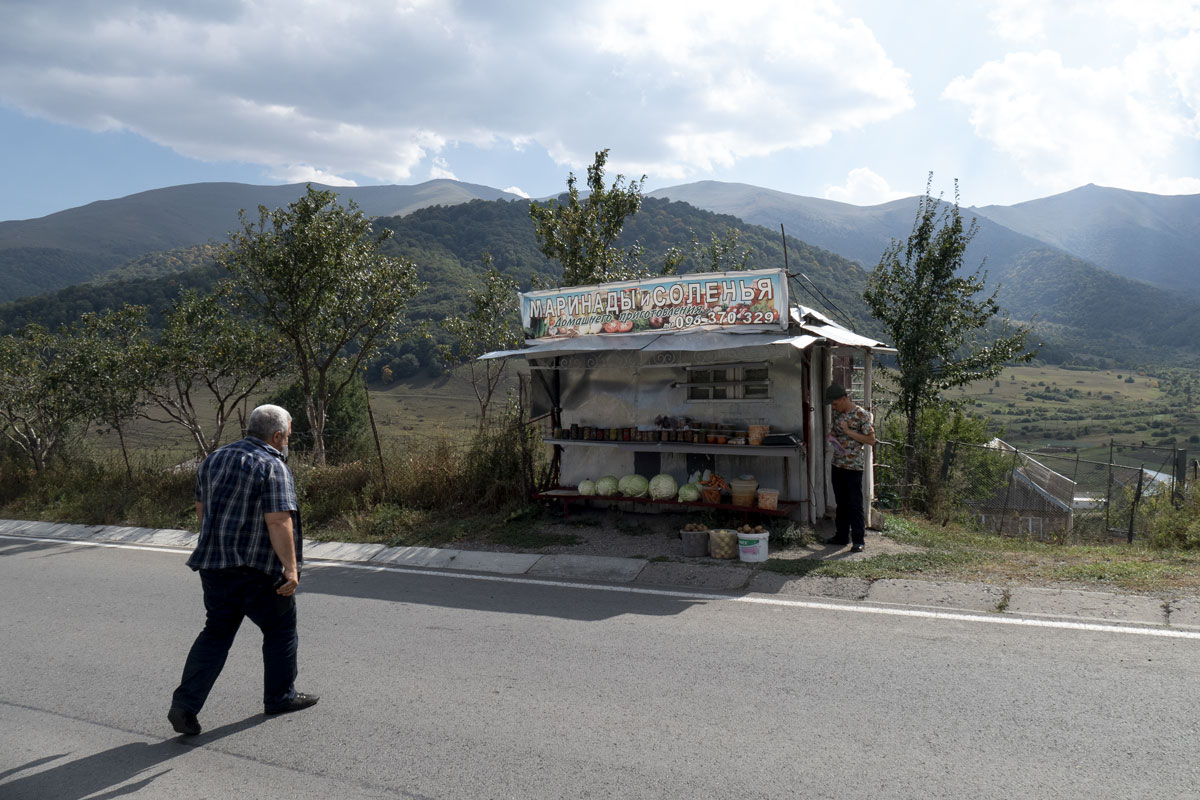
Neither the first nor the second were able to be photographed. But it was possible to talk to the salesman. He looked like an ordinary person from Molokan, only his simple, rural facial features were surprising. However, his speech was extremely strange. He spoke so slowly and drawn out that I took him for a feeble-minded person whom his family sent to sell cabbage on the road: apparently he was of no use at home.
The congress in Fioletovo was located just behind this tent. A few houses went downhill. Fields and mountains could be seen in the distance, and the sun broke through the clouds so that the landscape resembled a Biblical one.
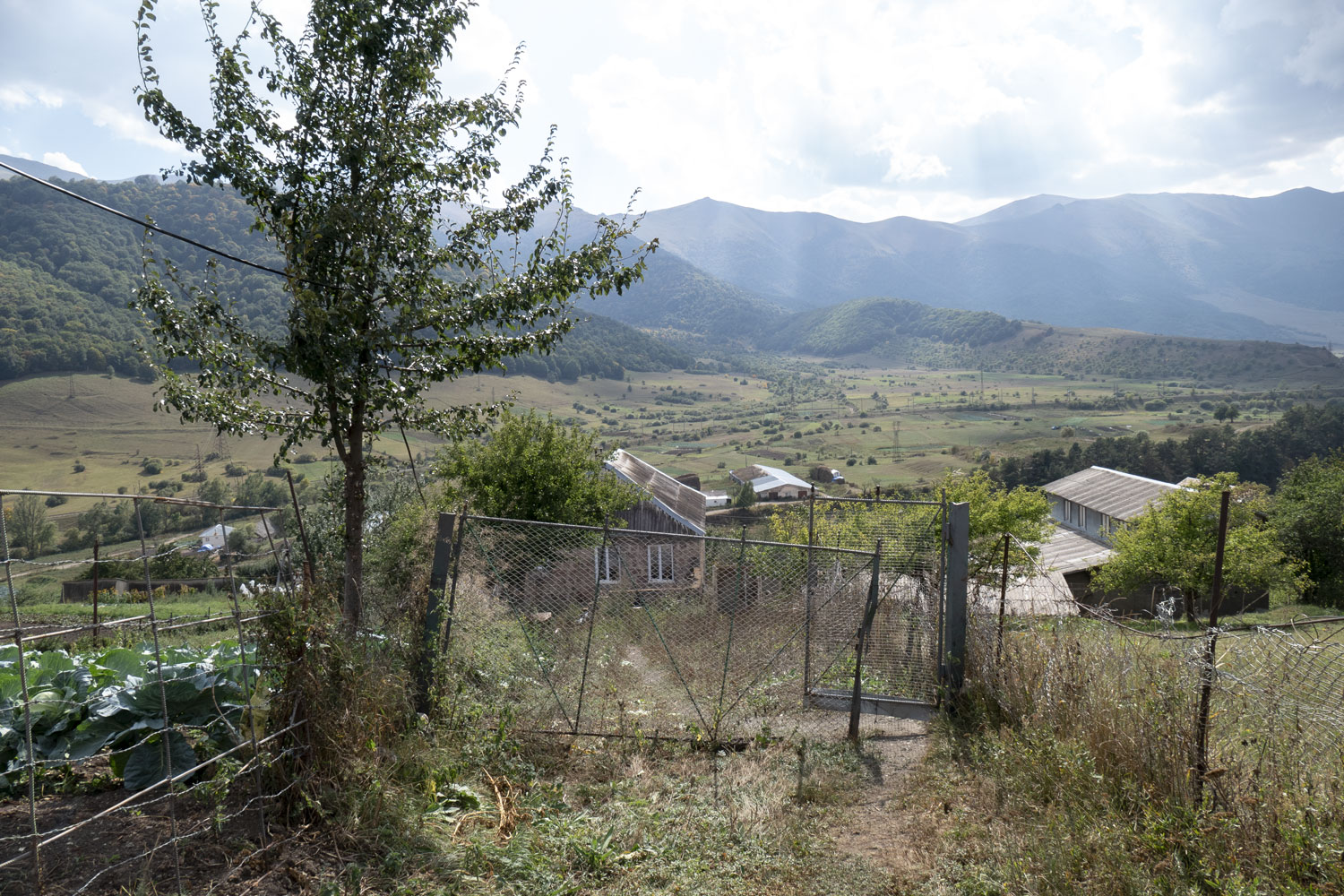
The road went downhill into the village. I wanted to stop in the village center, so that I could start exploring it from there. On the way, there was a fairly neat school building and several gardens where local residents worked.
However, there was no center to be found in the village. Only a broken asphalt road passed between two rows of unattractive old houses — and nothing more. Fioletovo had no church, no administration building, and no main square. Only houses, a road, and rusty water pipes hanging over the head.
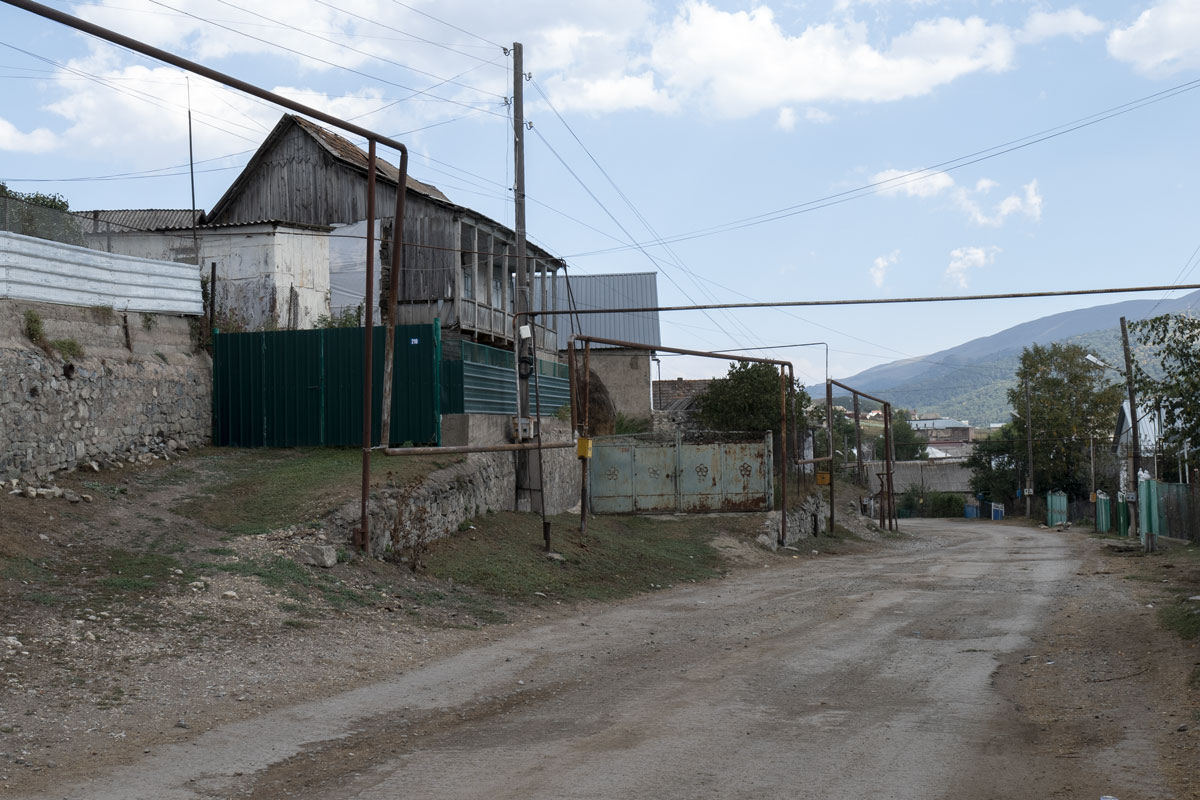
A little further, the asphalt on the road ends.
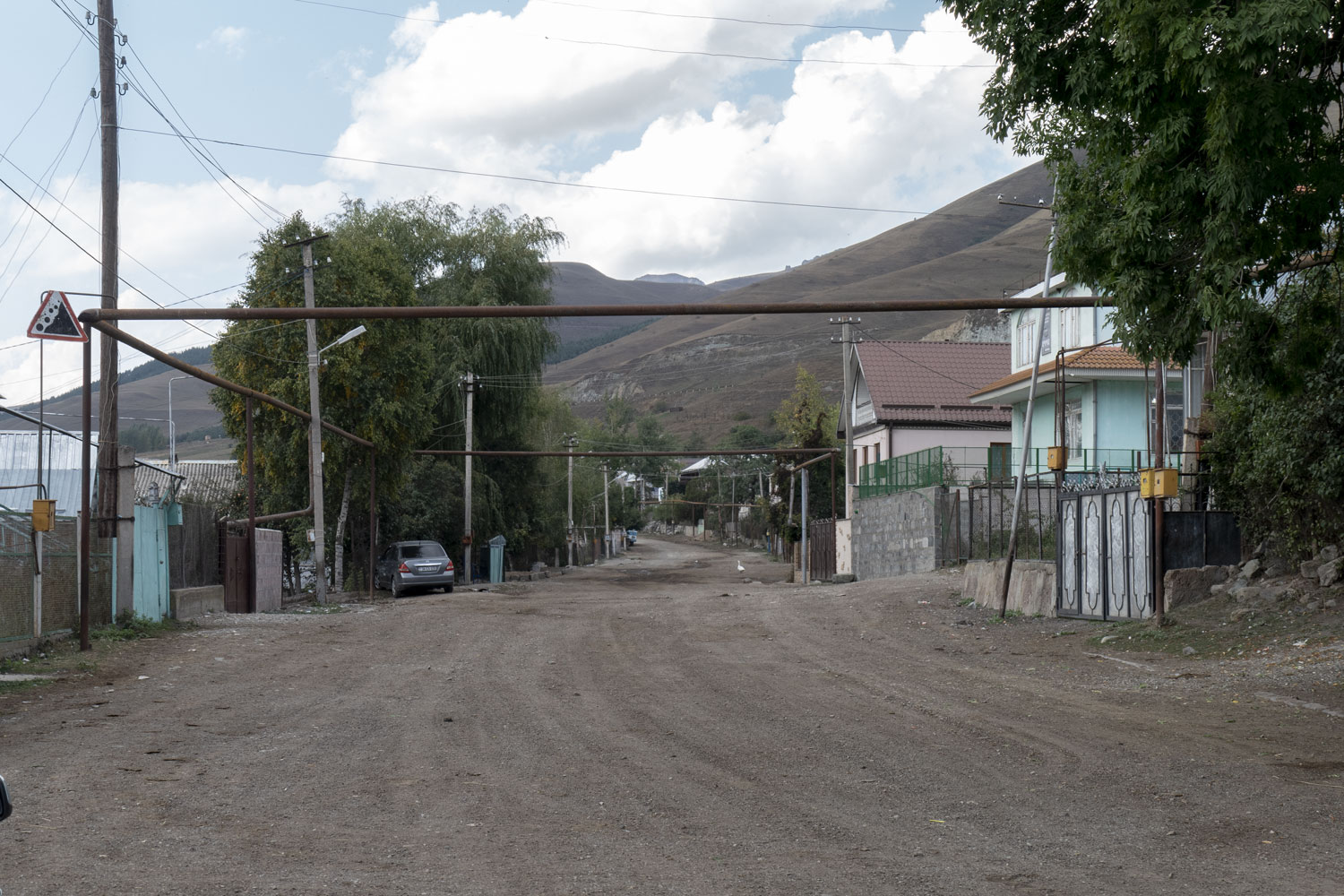
The houses in Fioletovo are almost all the same, with a sloping triangular roof.
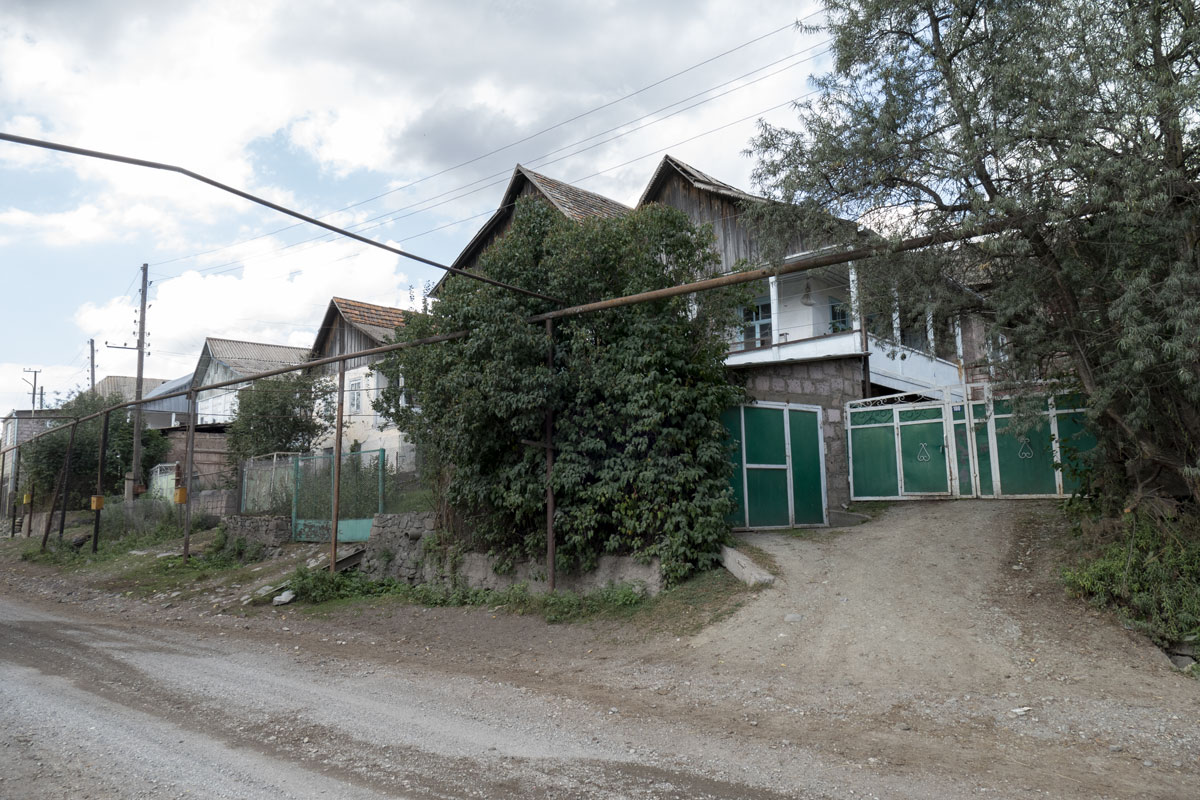
It’s strange that yards are fenced. Could someone in this religious community climb into a neighbor’s garden? Most likely, fences are simply built according to the old Russian tradition.
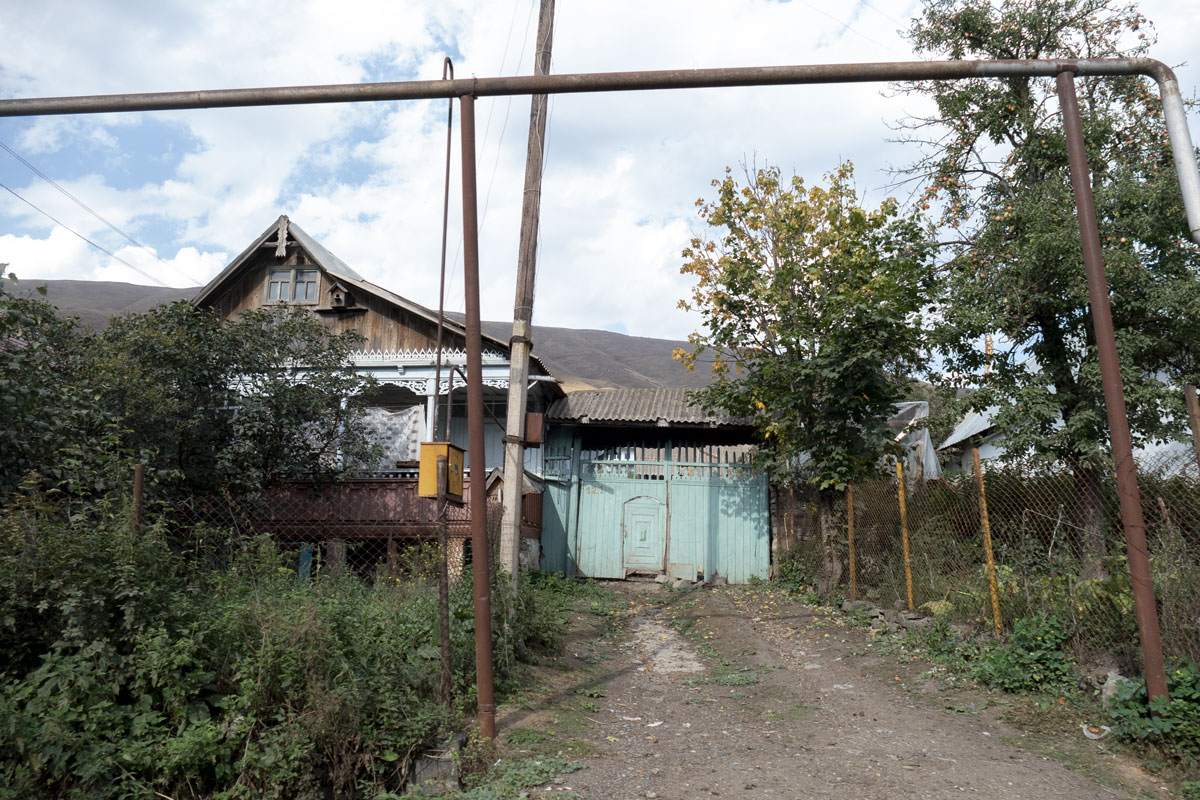
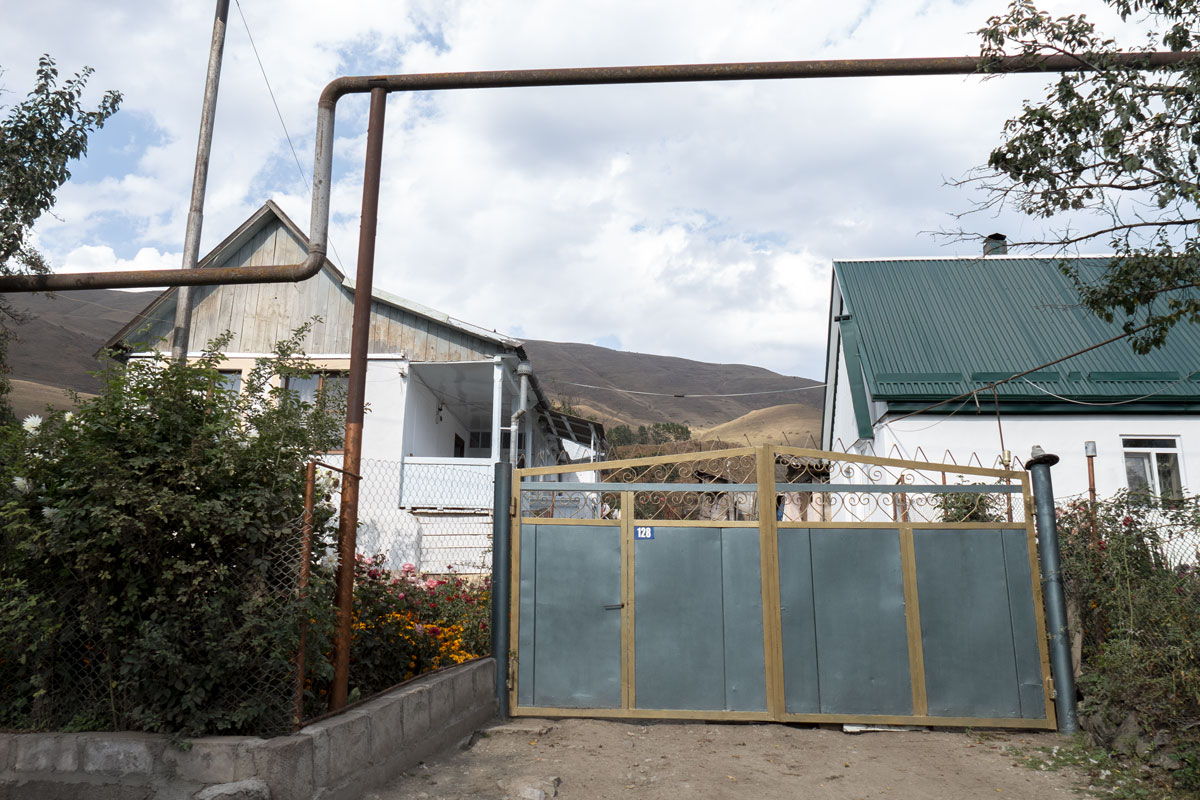
There is a flock of geese running along the road, which rush under the car and hiss.
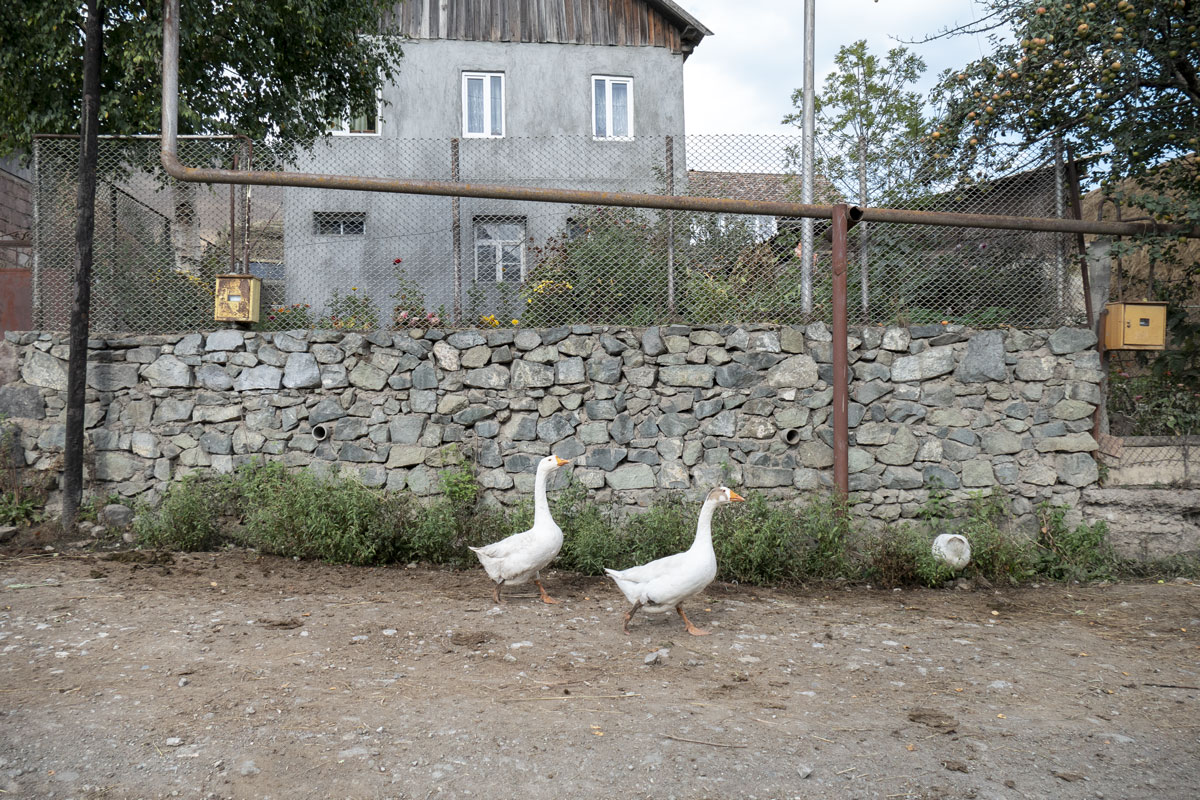
Almost every yard has a haystack towering over it.
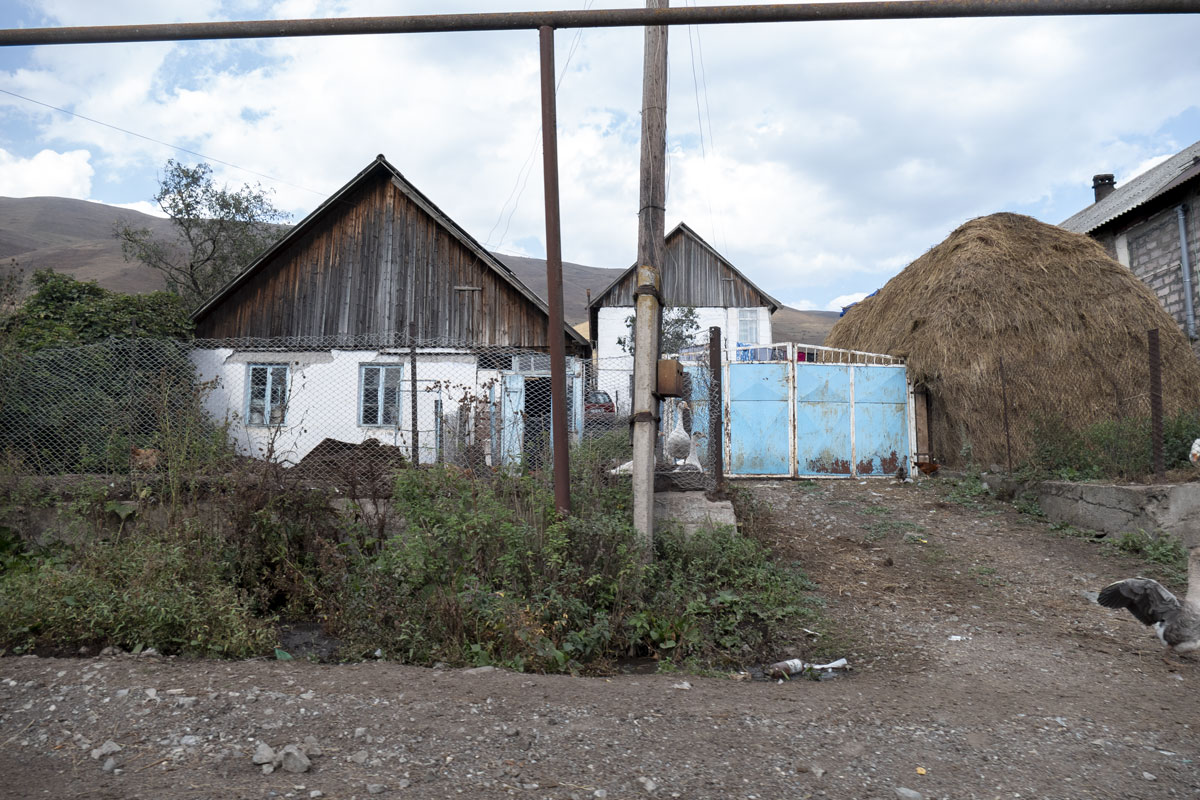
I didn’t come to the village of Fioletovo aimlessly. I was looking for the family of Natalia and Mikhail Rudometkin. They are the only ones among the Molokans who accept tourists. I had no information about where the Rudometkins lived or how to contact them. Therefore, I had to ask the locals.
After walking past several houses and not meeting a single soul, I finally heard a conversation in one of the yards. The gate was open, so I looked inside. Two men were digging next to an old Soviet truck. Squeezing a friendly grimace on my face, I approached them and began small talk, stretching out my words in the Old Russian manner.
“Good day. My name is Andrey. I’m a traveler from Russia, looking for the family of Natalia and Mikhail Rudometkins.Could you tell me where I can find them?”
“Who?” The men looked at each other. Fear and surprise could be read simultaneously on their faces.
“Natalia and Mikhail Rudometkins.”
“And who are they?”
“Well...” I became nervous, “There’s supposed to be a family living here who hosts guests.”
“Oh, the Rudomyotkins?” The man pronounced the surname with a “yo”, “Yes, they live here.”
“Where can I find them?”
“Just go over there,” the man pointed to the other end of the village.
“Alright, thank you. And what's their house number?”
“House number?” The men looked at each other again, “I don't know.”
“Hmm. What color is their house then?”
“What color? Well, how to say. Normal.”
The men from Fioletovo looked at me as if I was an alien. And I looked at them the same way. What does “normal color” mean? How can he not know the house numbers in the village?
Both men looked the same. Besides being alike, they also looked like two drops of water resembling a sauerkraut seller. But what was even stranger: the men spoke just as slowly and drawn out! Then I realized that the seller wasn’t feeble-minded at all. It was the local way of speaking.
But how could they not know the house numbers and color? Fioletovo is located in the Armenian countryside, not on the islands in the Pacific Ocean. The residents should know their numbers and colors.
The second man intervened in the conversation.
“You’ll recognize their houses, they stand out from all the others.”
“Are they white or brown?”
“Well, I think they’re brown. They also have a fence.”
“Is it far to their place?”
“It’s over there.”
“Well, how many meters?”
“About eight hundred meters.”
After saying goodbye to the men, I went downhill through the village. Goosebumps ran down my back. The conversation turned out to be somewhat creepy, broken, and uncomfortable. Molokans don’t know the house numbers in their own village, they don’t understand colors, and speak incredibly strange. But why?
In the indicated direction, two neat houses were indeed found that did not look like all the others. They were milk-white and white in color, and only the fence was brown.
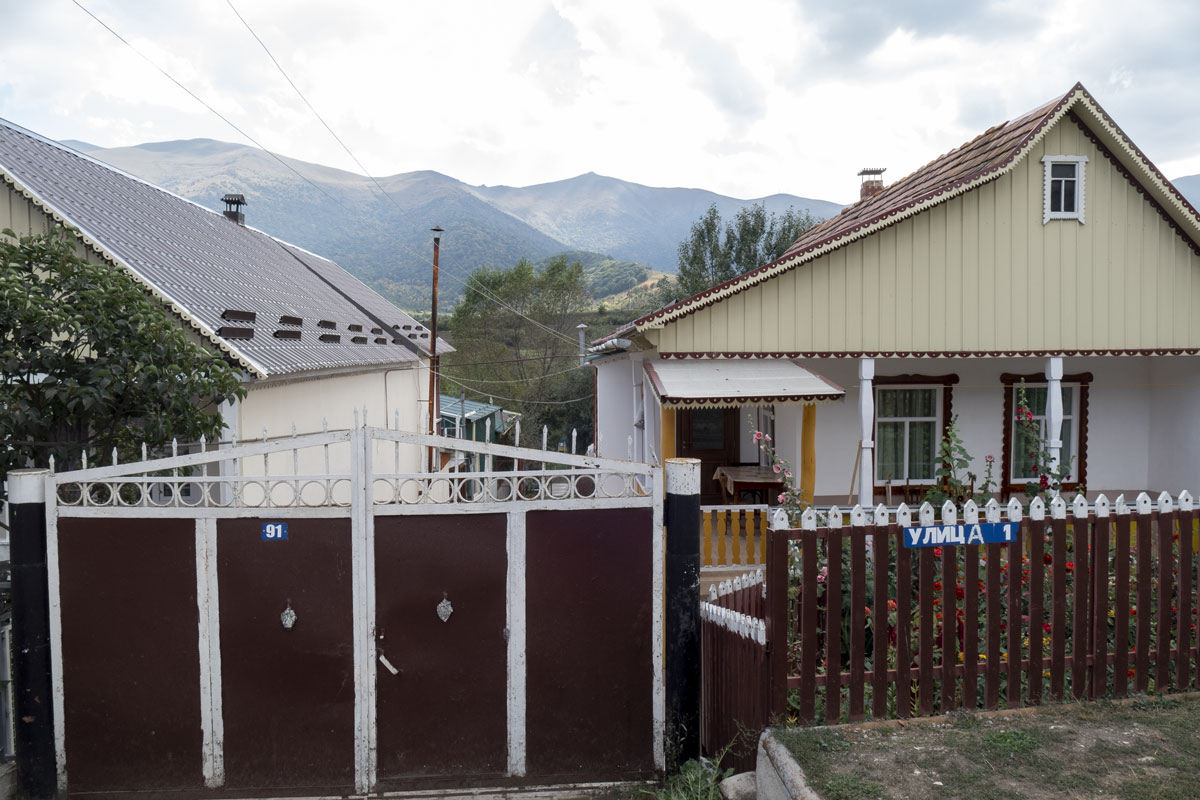
I knocked on the iron gates. A woman came out.
“Hello. Are these the Rudomyotkins’ houses?”
“Yes, these are their homes.”
“Can I speak with them?”
“I am a Rudomyotkin, what do you need?”
“My name is Andrey, I am a traveler from Russia. I heard about your community, that you host guests. Can you accommodate me?”
“Oh, you arrived late. If you had come an hour earlier, but now I am going to work in the fields.”
“What a pity. You see, I specially traveled to you from Yerevan. Maybe I can look around here by myself?”
“What will you see here by yourself...”
The woman turned out to be Natalia Rudometkina. At first, she didn’t want to let me in and said that it was time for her to go pick potatoes. But I was persistent enough. Natalia gave in and let me into the garden.
“Come in. Here, you can look around. You can go further there, there’s a field.”
“Can I talk to the locals?”
“Yes, go to the field, we’re working there. Talk, ask whatever interests you.”
The yard turned out to be overgrown with weeds.
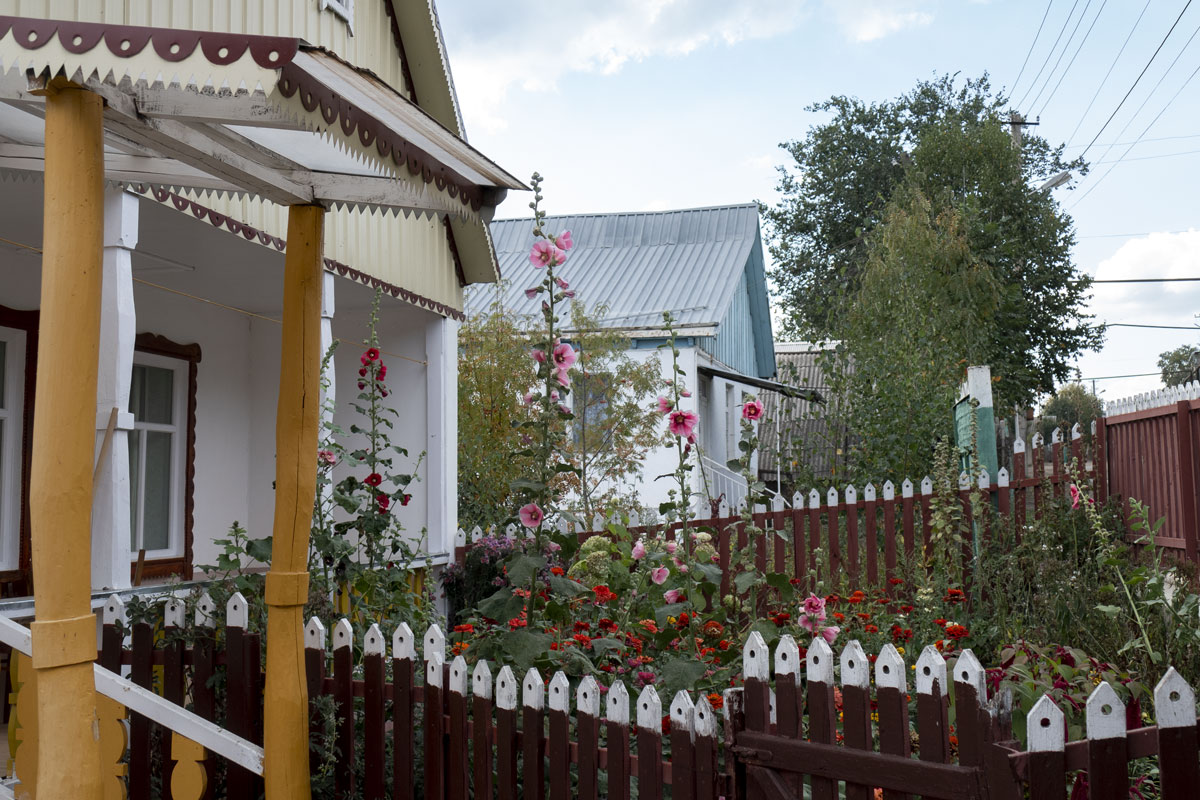
It also turned out that the Rudometkins themselves live in one of the houses, and the other is intended for tourists. Natalia says that visitors come often and from different countries. People come to see the Molokan community from Spain and America. However, Natalia says that due to the pandemic, there are fewer guests.
“Ah, so we’re reading the news,” I notice to myself.
It turns out that the Rudomyotkins have reached an agreement with tourist agents who specialize in unusual tours. It is they who negotiate the excursions. The Rudomyotkins took a big risk when they started this business. The community doesn’t like outsiders. But the tourists turned out to be mostly polite and cultured people. Now the Rudomyotkins talk about their village, the history of Molokans, everyday life; they offer borscht, pancakes and other Russian dishes.
The second house was built for their children, but the children grew up and left the village. Natalia says that nobody wants to live in the village anymore, and people are leaving for big cities. For example, Natalia’s daughter moved to Balashikha. But some still like living in the community. Natalia’s husband, Mikhail, returned after working for many years at a museum in Kaluga.
Mikhail arranged the yard, repaired both houses, and made a new fence. The yard turned out to be very clean. There was a dog, several chickens, and a woodpile with firewood.
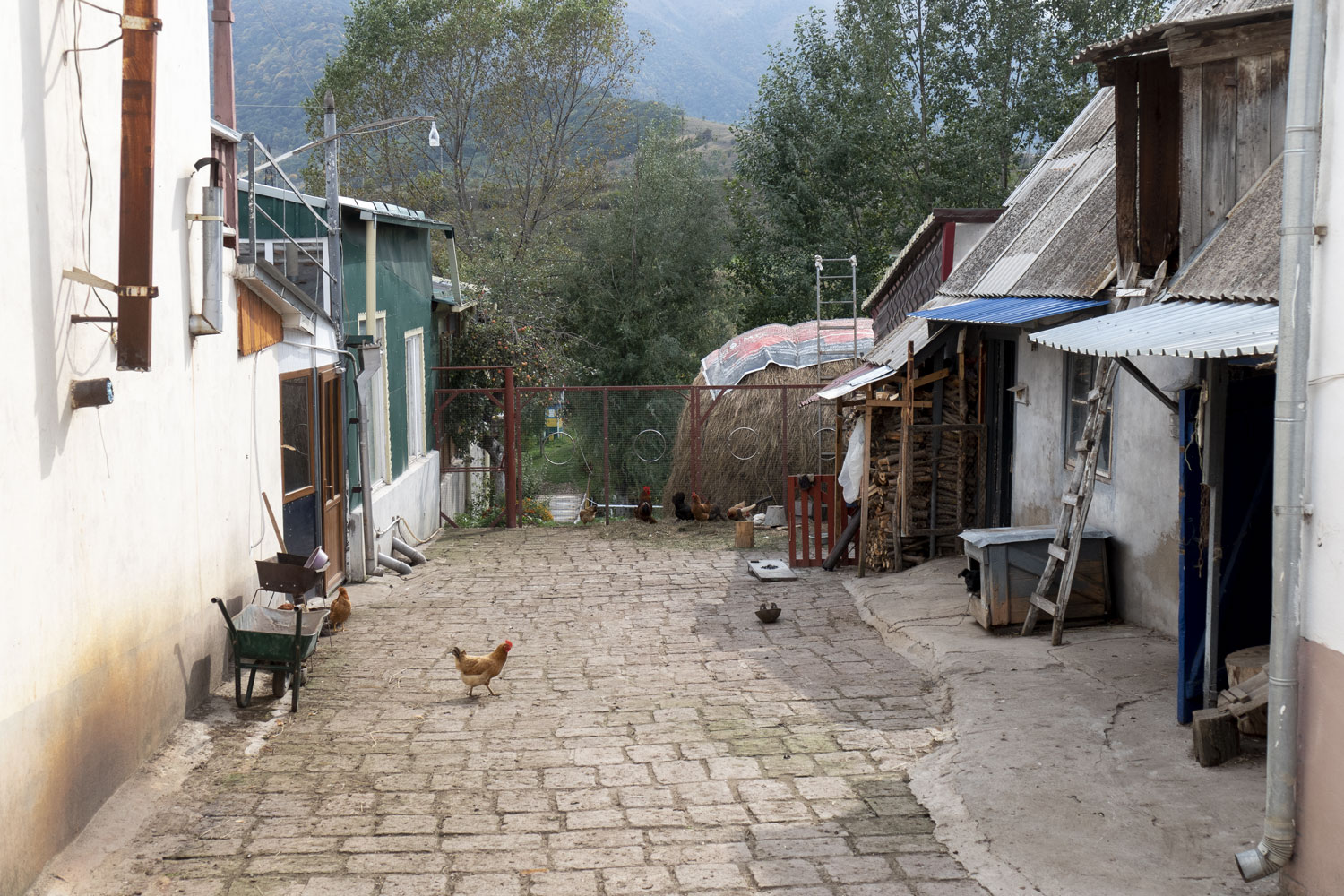
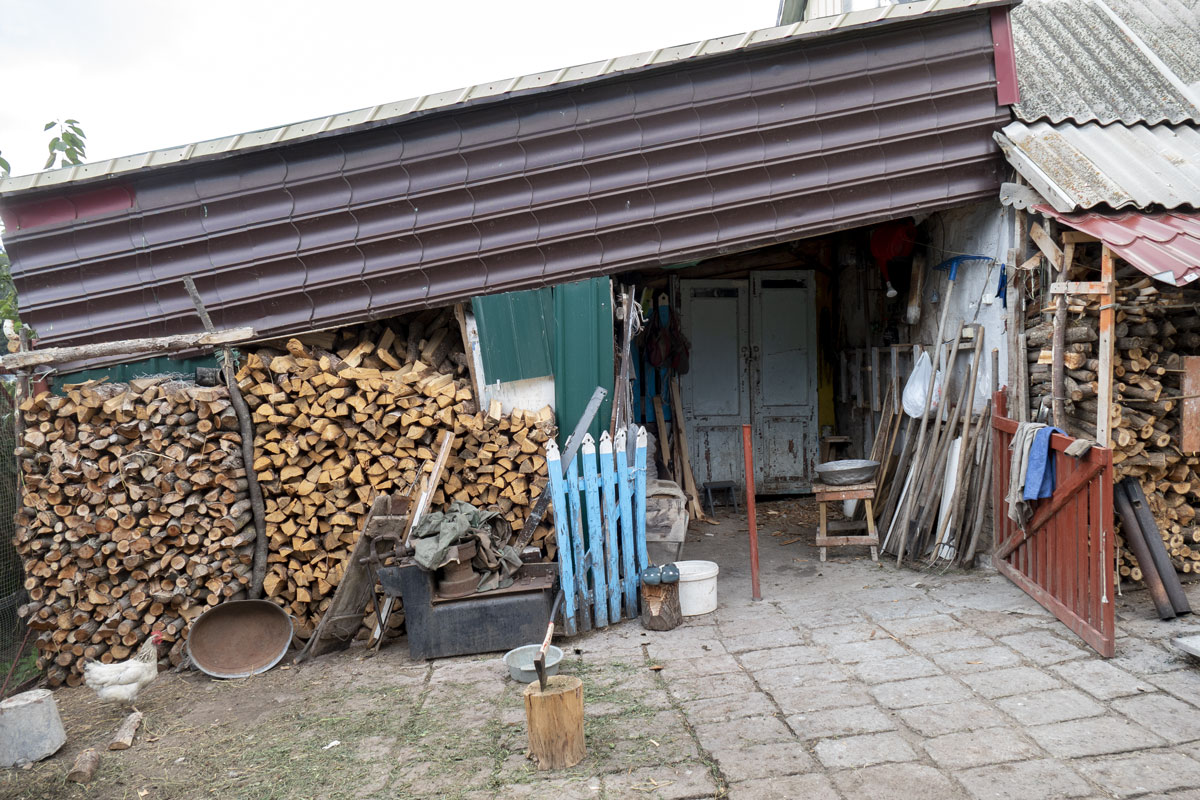
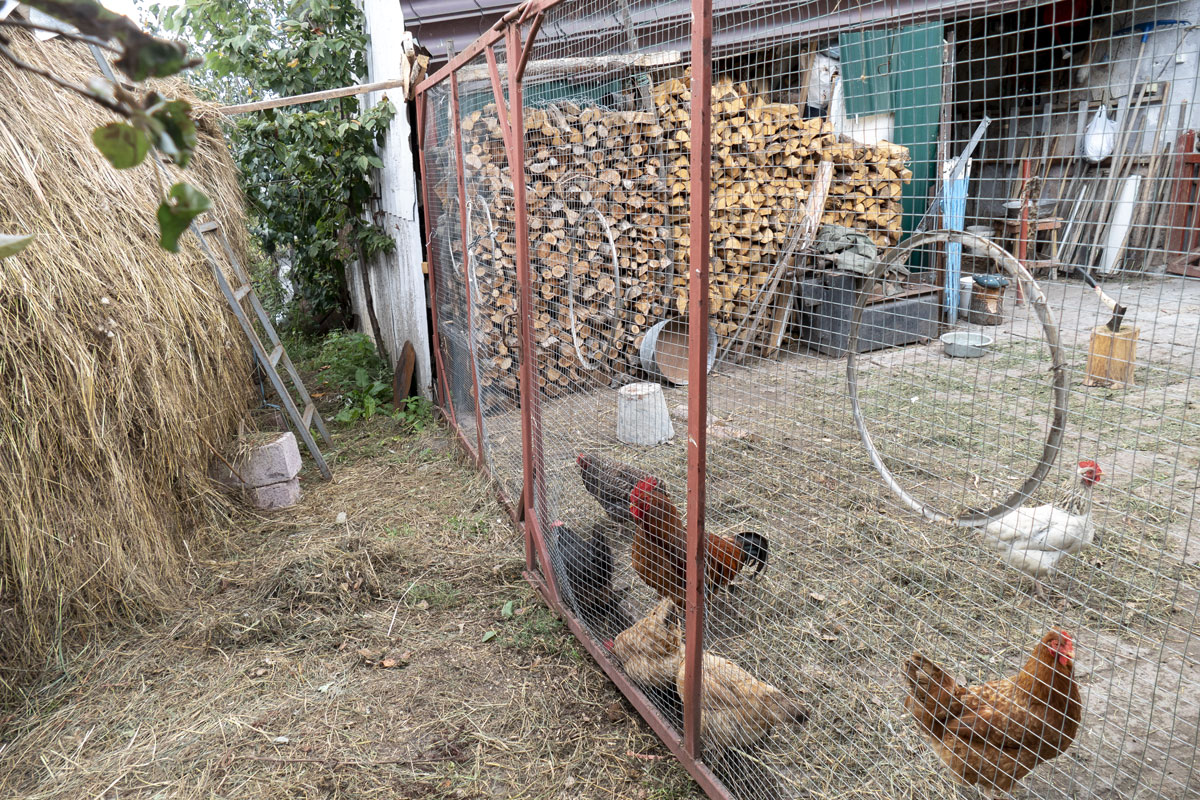
Behind the iron fence is a garden planted with turnips, cabbage, and something else. There is a greenhouse and a haystack in the garden.
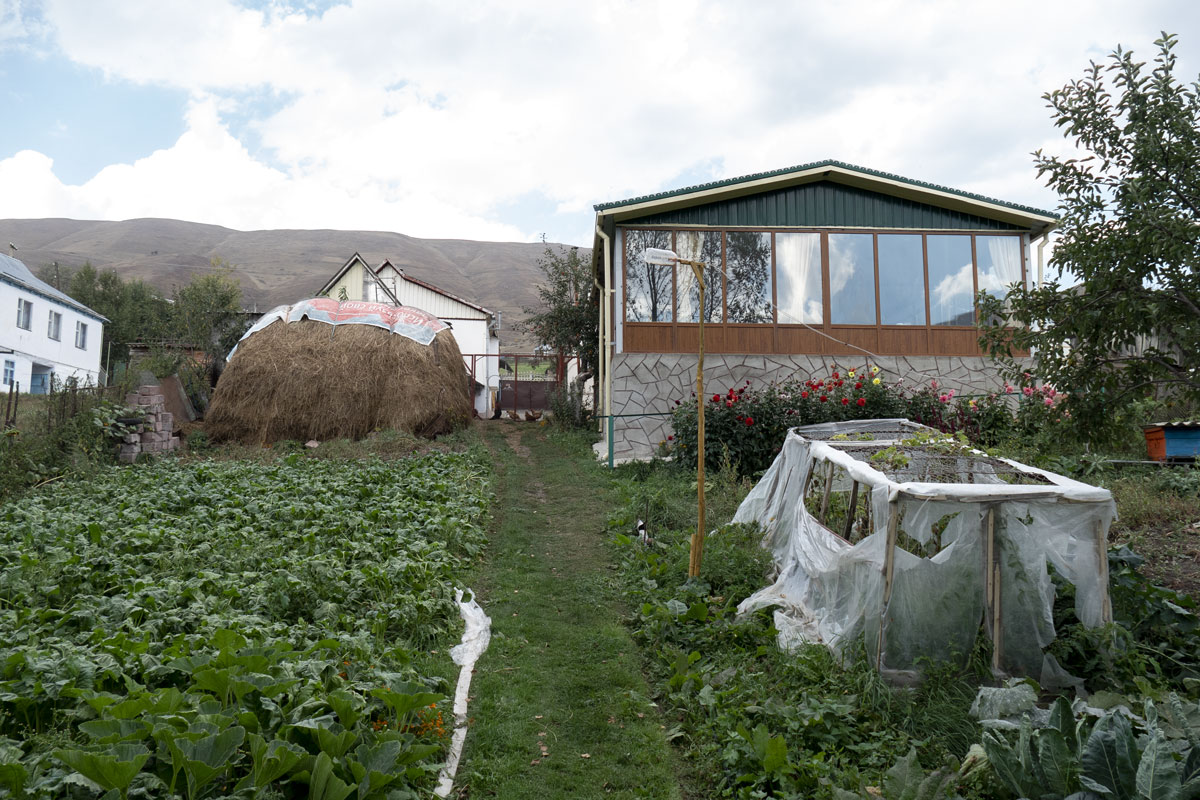
There is a small stream flowing behind the garden from which the Rudomyotkins take water. A neat bridge crosses over the stream, and beyond it is a colorful gazebo.
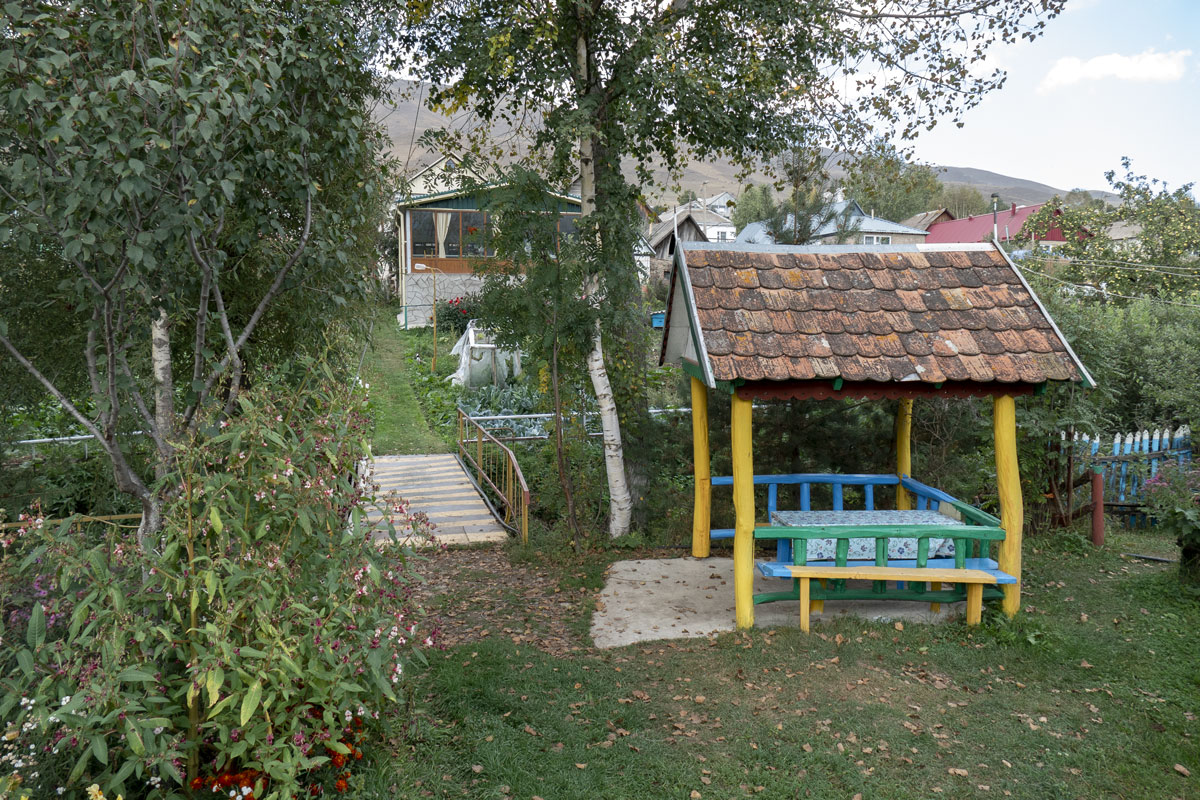
Further on is a row of flowers, small sculptural forms, and a pond.
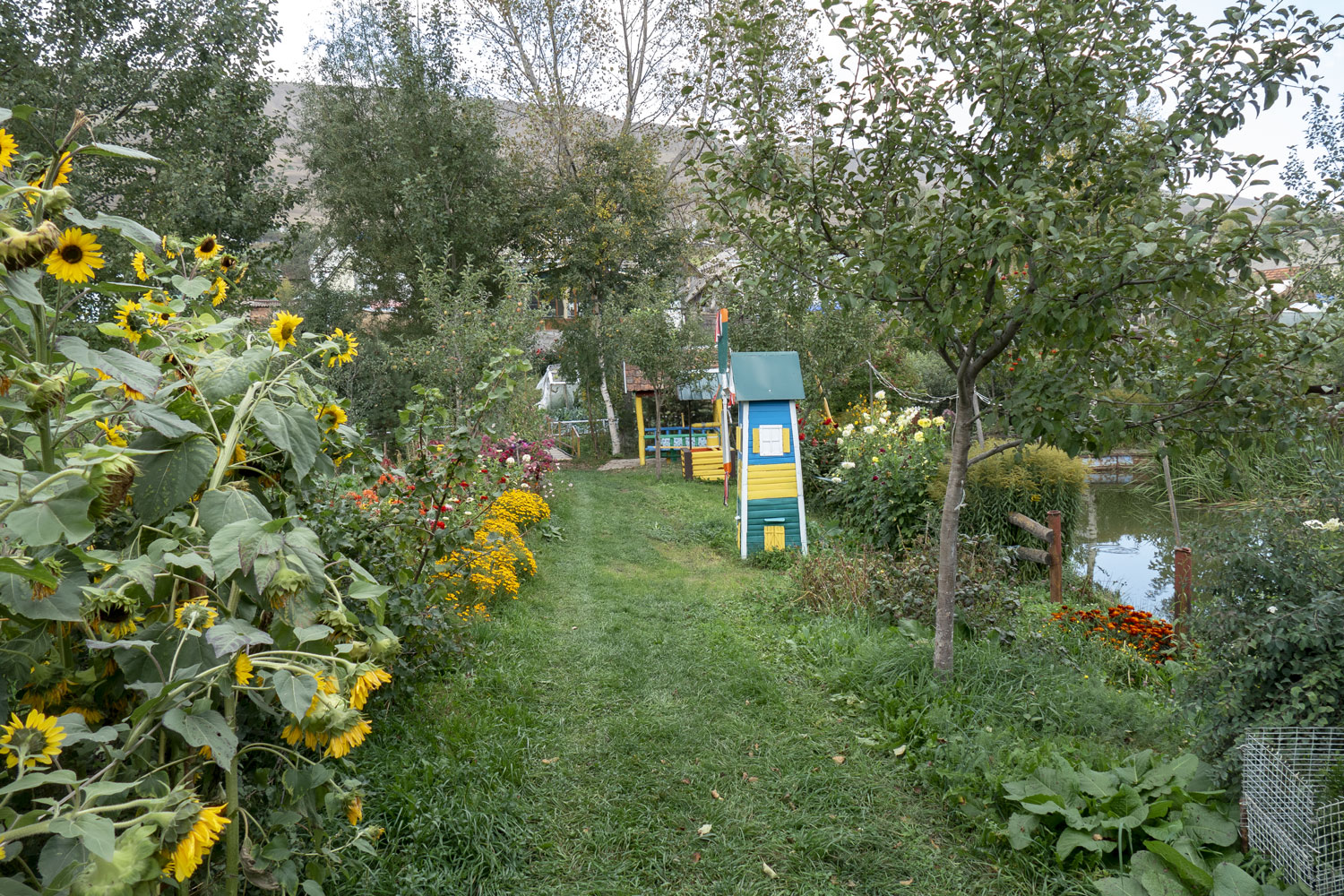
Then an open field begins.
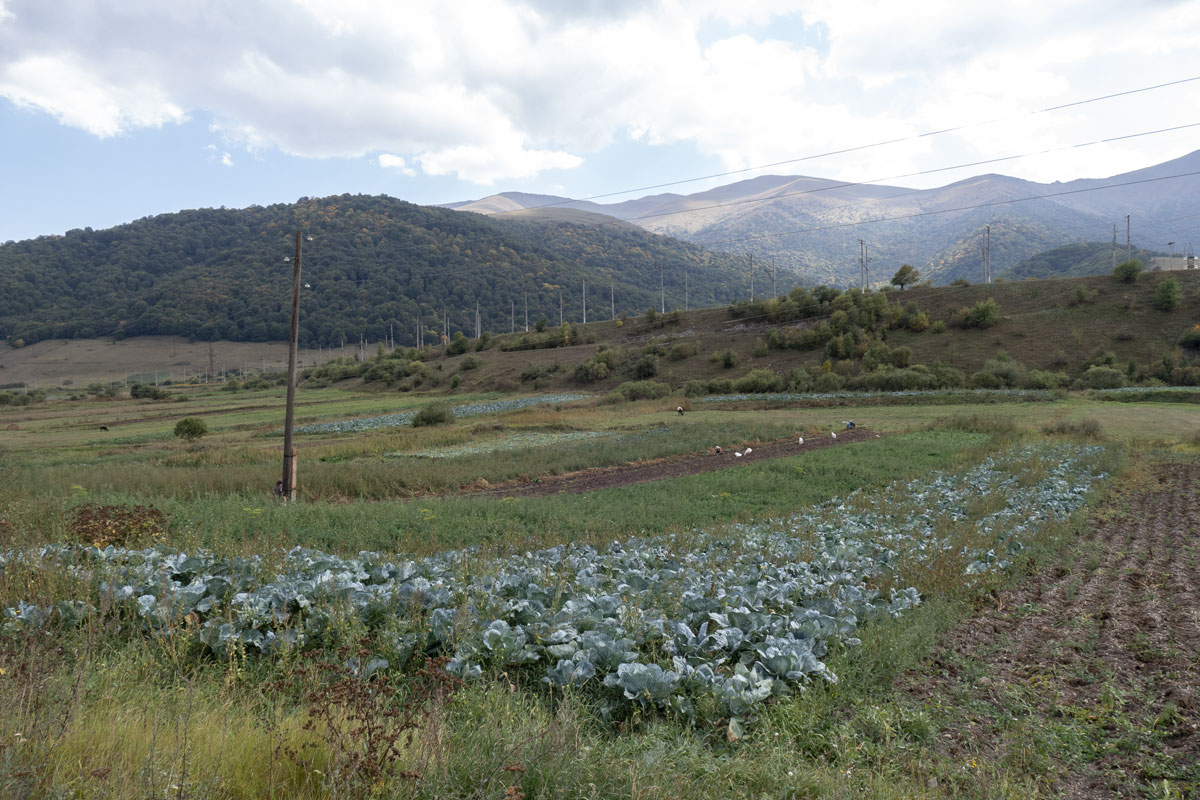
Natalia led me to her garden.
”There, I’m off to work. Further along is the cemetery, and in the other direction, more people are working. Go, talk.”
”Thank you, Natalia! May I take a picture of you?”
”Why would you need that?”
”Oh come on, you look so wonderful!”
”Ah, so you’re probably writing an article, aren’t you?”
”Not yet. After all, I haven’t seen anything yet.”
”Look, you people come here, I tell you things, and then you write something completely different than what I said. You distort half of it! You've written all sorts of nonsense on the internet. I don’t like being photographed. But alright, go ahead."
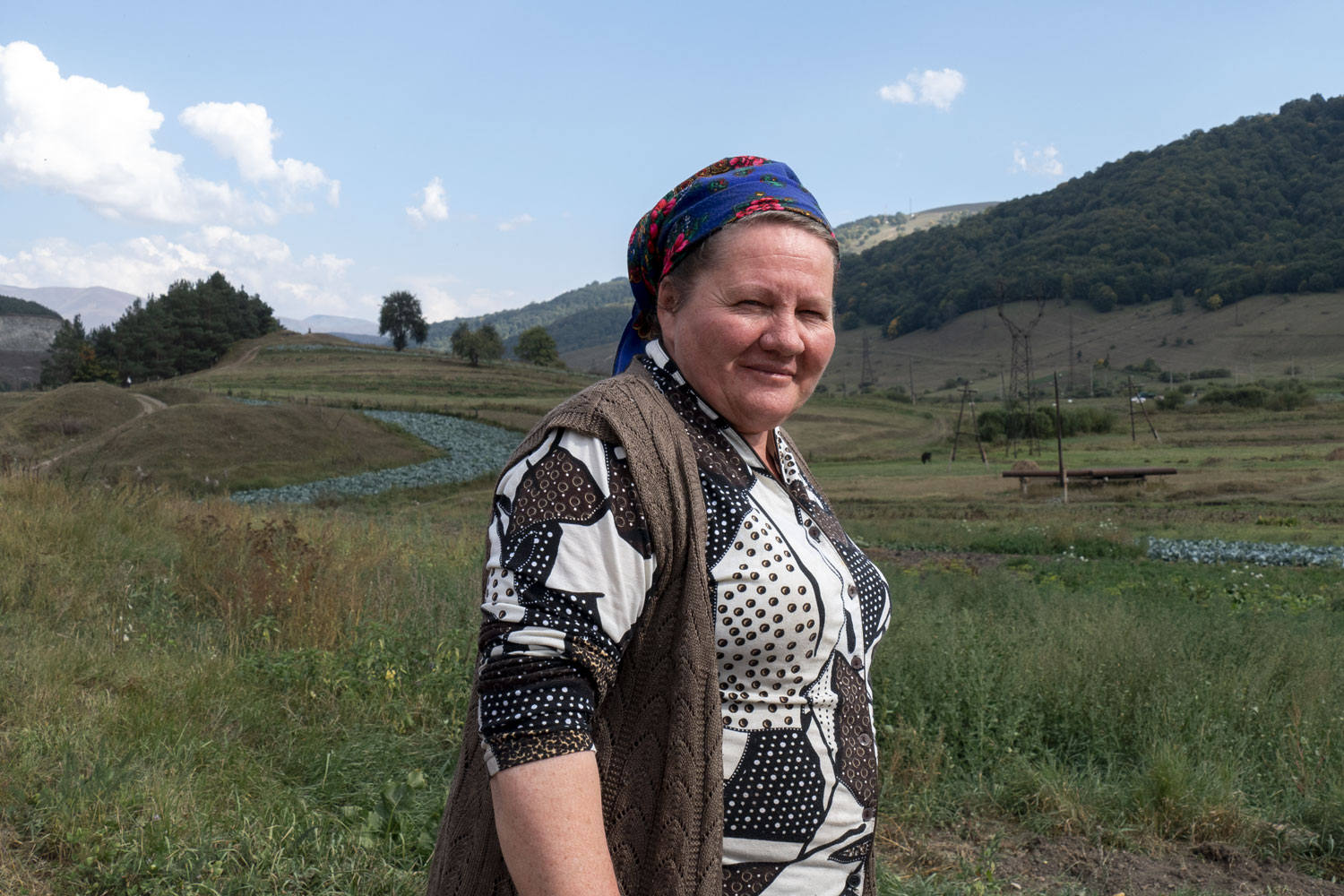
Molokans don’t like to be photographed. After Natalia’s words about how tourists distort everything, I won’t make any claims. But some religious communities believe that photography takes the soul out of a person. However, this was said about Africa. In any case, Natalia’s photograph is the only one that turned out well.
I said goodbye to Natalia. She went into the field, to a long weeded area, to harvest potatoes. I went further and found the cemetery.
It was located right by the road, on a hillside. There was no fencing or tombstones found on the graves. The Molokan cemetery is strange. I have never seen anything like it. The grave is covered with a pile of stones, and at its head stands a strange iron structure in the shape of a birdhouse.
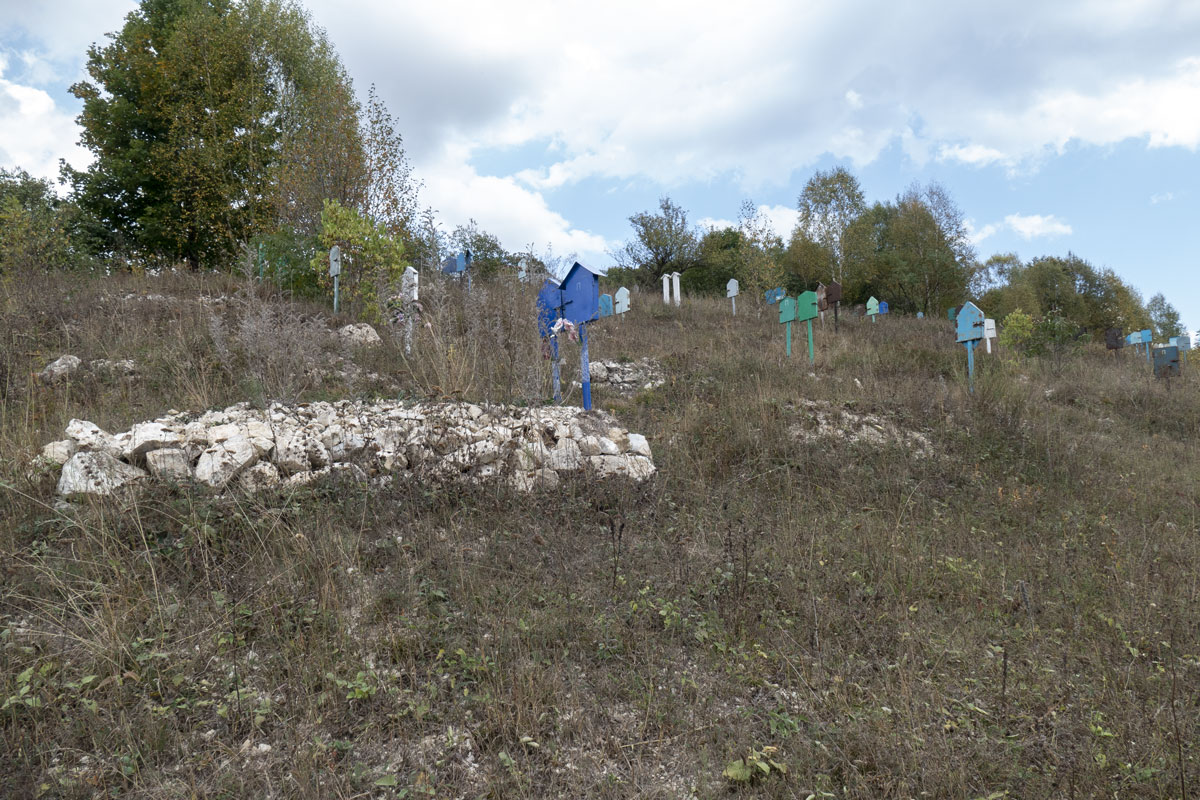
I couldn’t figure out what these little houses were for a long time. Maybe it’s something like a “house of God” where the soul goes after death? It turned out that it’s just a box with a board inside with the name of the deceased. The box is designed for one purpose: to protect the board from rain. The form of the house means nothing; it’s just design.
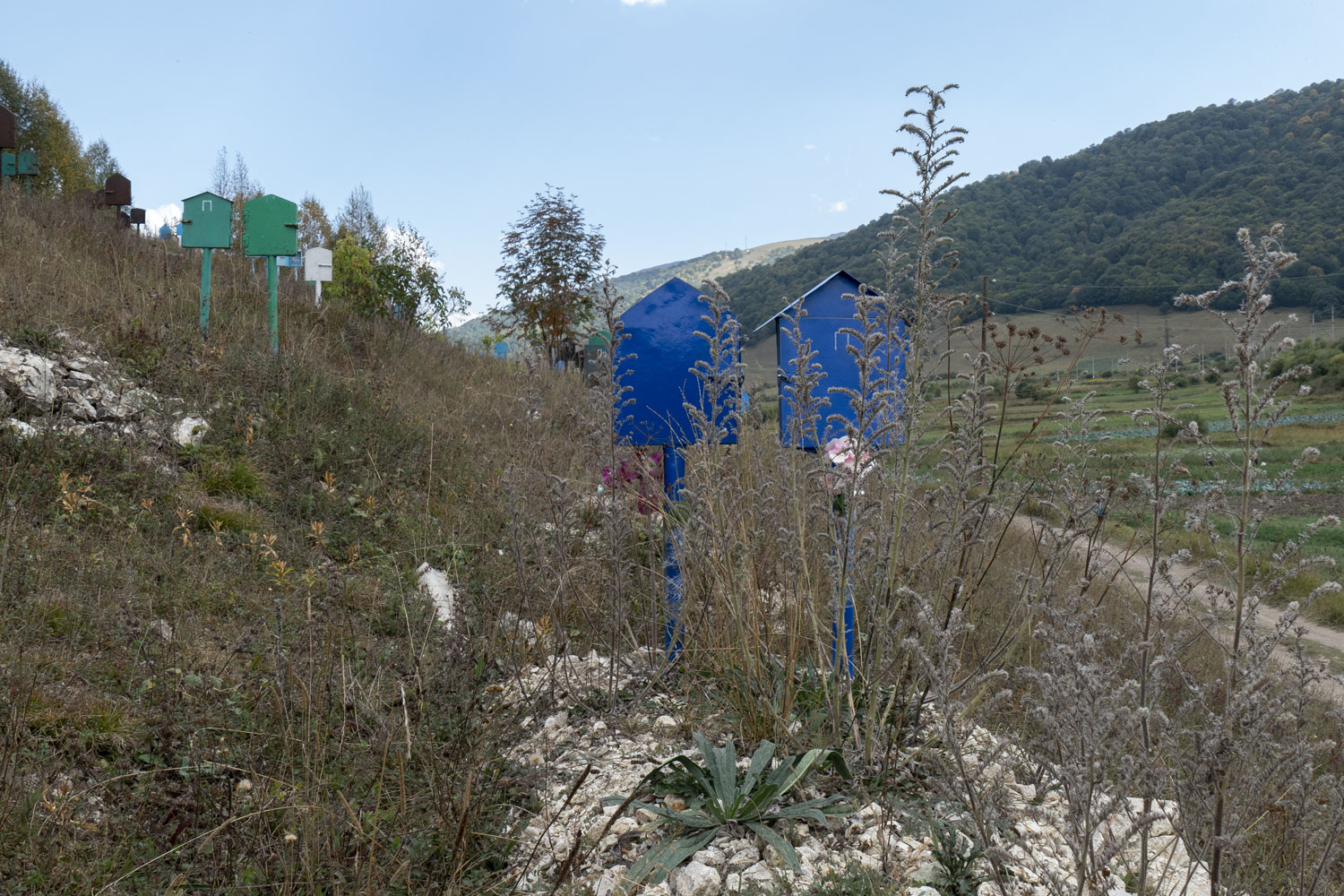
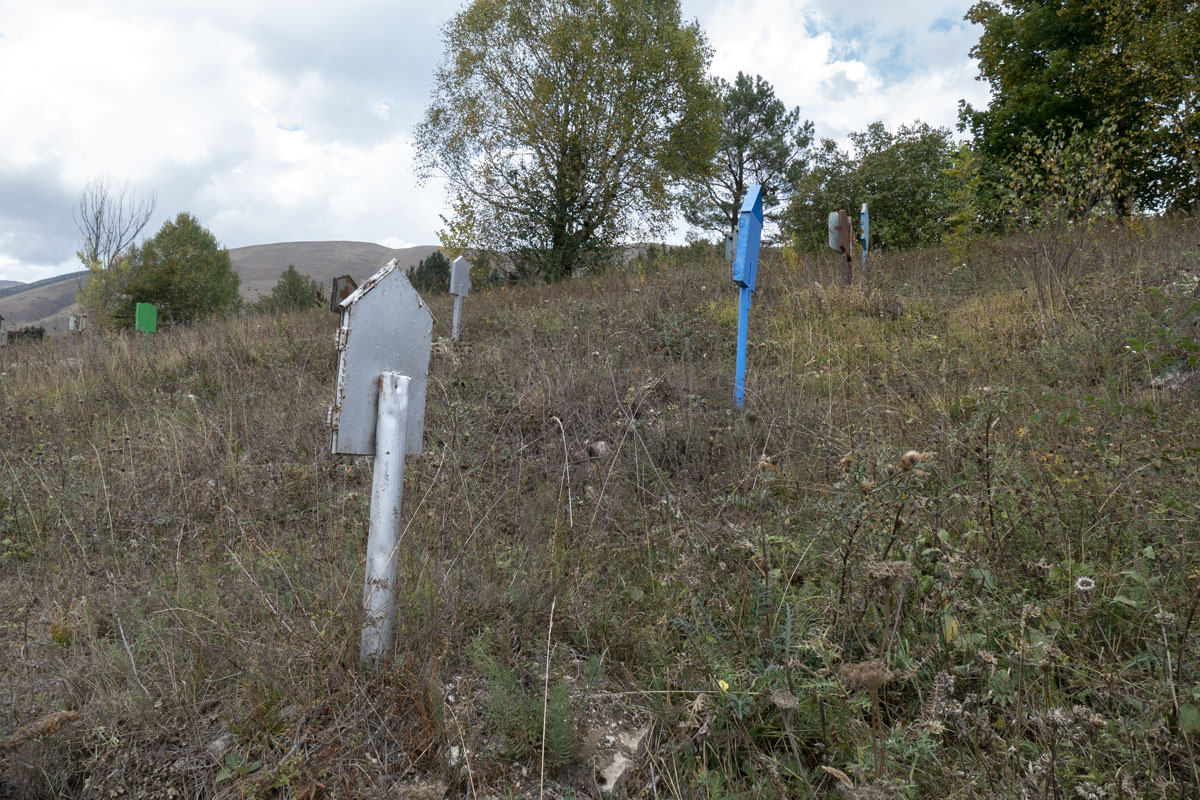
In the field, I came across an old man in his seventies, gray-haired and hunched over; he was wearing old black pants and a white linen shirt. He looked like a peasant from the 19th century, working for his landlord. I tried to talk to him.
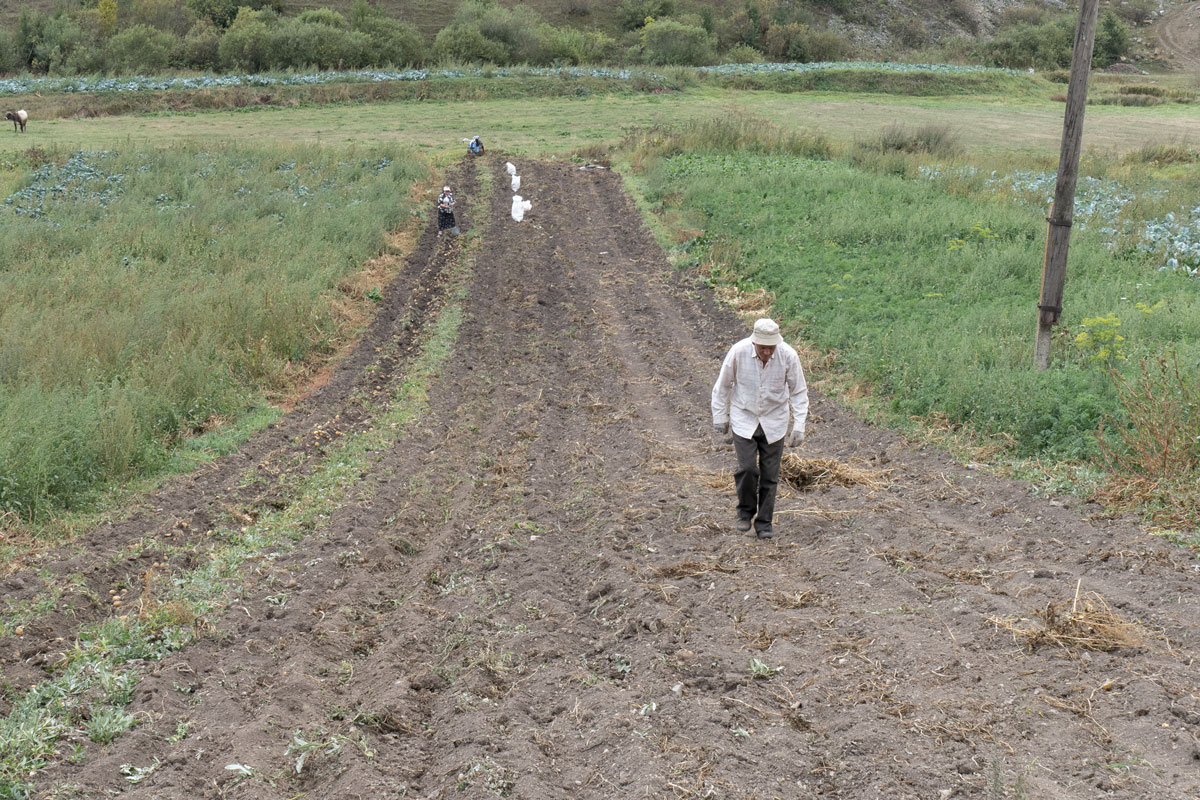
"Hello!”
(the response is silence)
“How are you?”
“Just as usual.”
“Tell me, please, are you planting potatoes or harvesting?”
“Harvesting.”
“Tell me, how long has your community been living here?”
“For a long time.”
“Approximately since the times of Alexander the Second?”
“Yes, that’s right.”
“What year did the first resident come here?”
“Well, around 1835.”
I walked back with the old man to Rudomyotkin’s house, and all the way he looked down at his feet and answered my questions briefly and to the point. I never managed to get him into a conversation. When we got to the house, the old man simply went off in his own direction without saying goodbye.
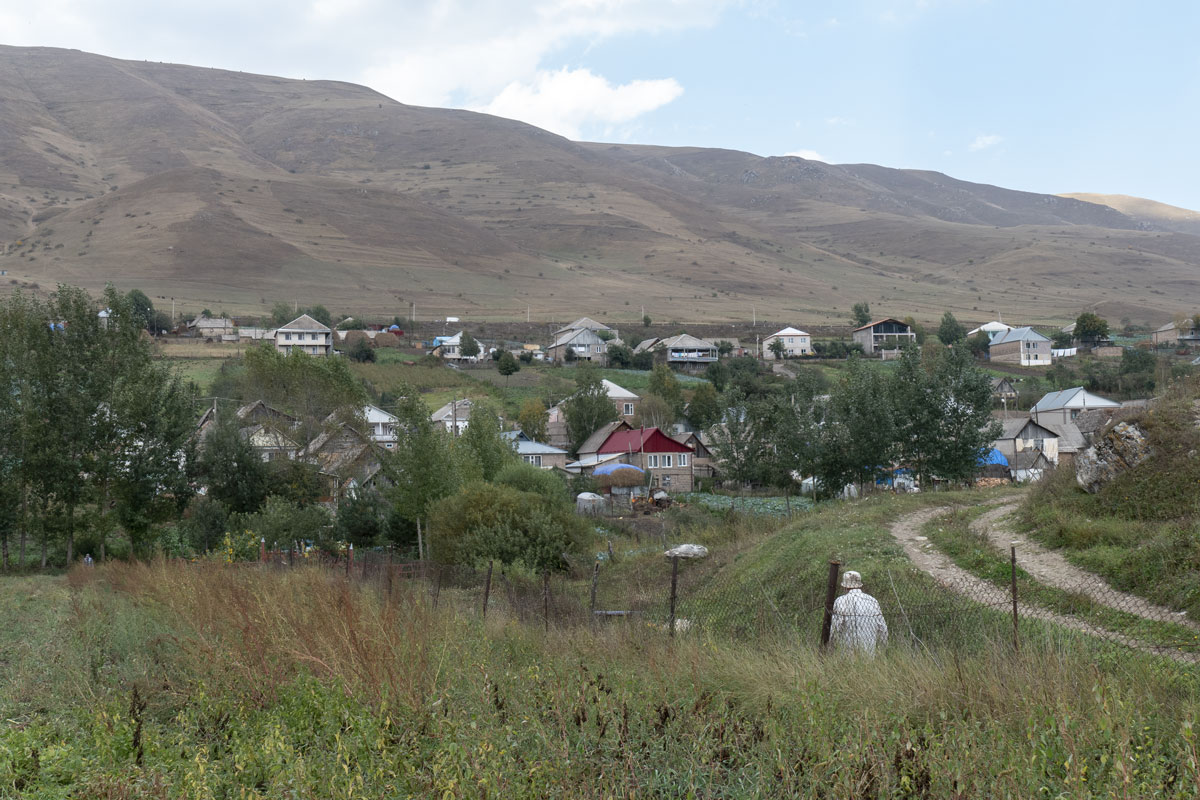
In another direction, workers on tractors could be seen. I decided to go to them. Maybe someone will give me a detailed interview?
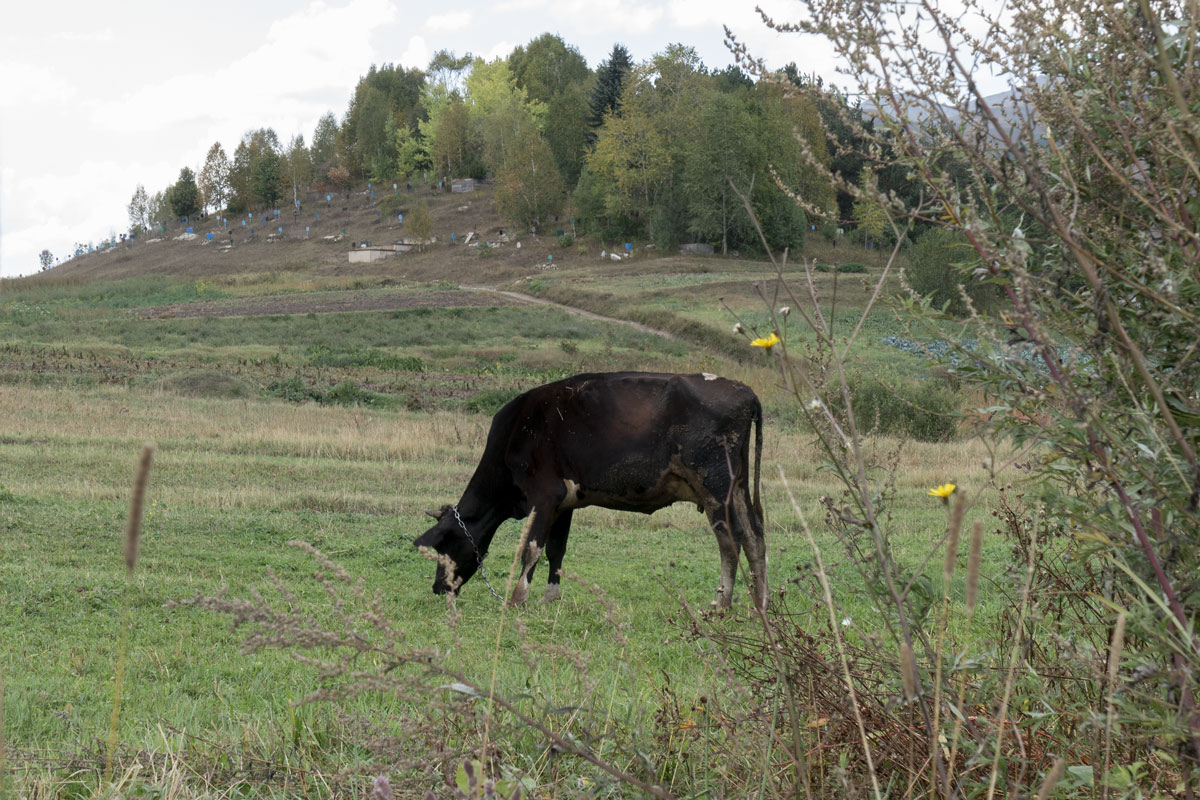
In the distance, a person — a boy carrying something — appeared. Knowing that Molokans can’t stand being photographed, I decided not to approach him closely and take a shot using a telephoto lens. There were three hundred meters between us, and I was sure that the boy wouldn’t realize that I had a camera.
I crouched down, zoomed in to the maximum, and aimed the lens at the boy. Instantly, he froze in place and covered his face with two Coca-Cola bottles!
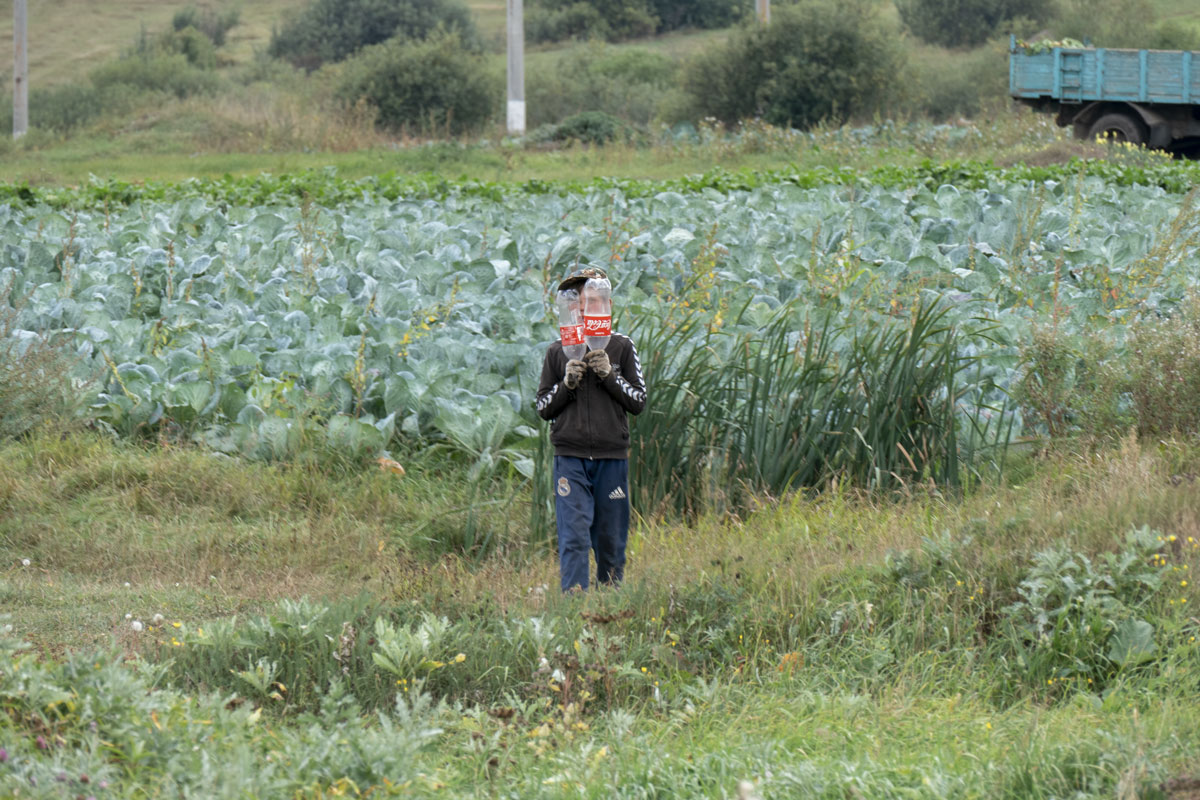
I put away the camera. The boy hid the bottles behind his back. I aimed the lens at him again — he hid behind the bottles again. That’s when I approached him and said:
“Hi. Can’t I take a picture of you?”
“Nope.”
“Why not?”
“I’m dirty. We’re harvesting potatoes.”
“Wait, but I’m just taking a picture of your face. Your face is clean. Can I?”
“No.”
“Alright then. Have a good day.”
“You too.”
The boy appeared to be about ten years old. His facial features were the same as those of the men I had met in the village, only younger.
It’s amazing how all the Molokans look alike! The thing is, they have been living in a community for many centuries and only interact with each other. Molokans simply do not have mixed blood, there are no “foreign” genes, no signs of other nationalities.
Therefore, it can be said that they are the “real Russians” who have survived to this day. Their faces are the epitome of Slavic features. Rural, unassuming, slightly oval, rosy, and fair — as if taken from an ethnography textbook.
It is said that the Molokans also speak with a pre-revolutionary accent. They draw out and elongate their words. At the same time, they speak in modern language and even keep up with current events in the world. But their speech is similar to an archaic one lost in the ruins of the Russian Empire.
The boy went on with his business. I was approaching the people working in the field.
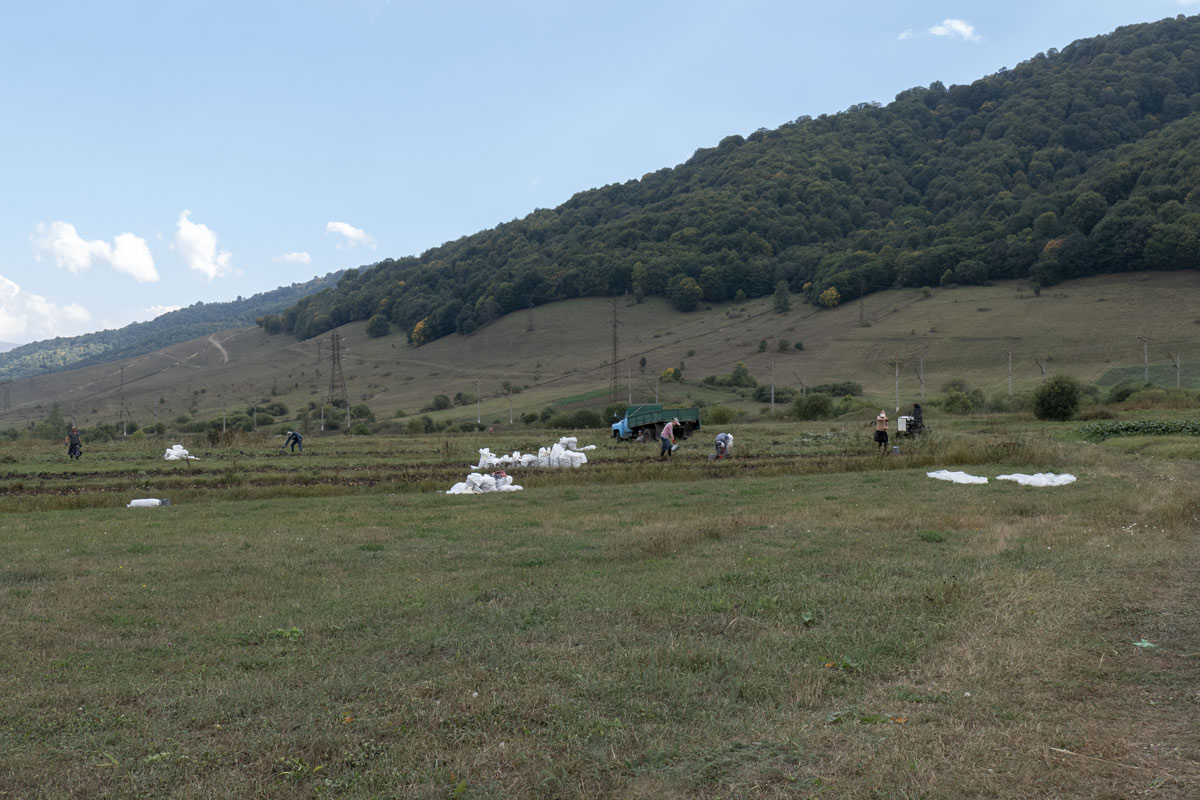
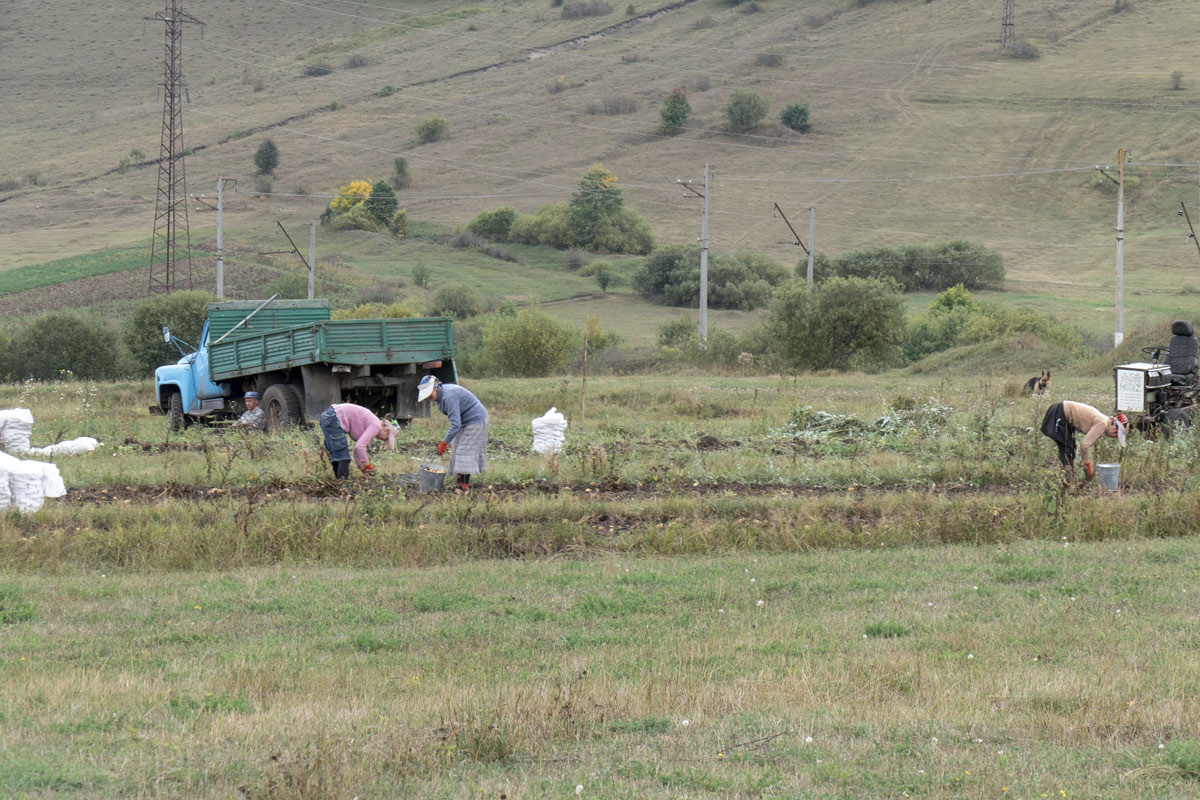
All the people working there noticed me. The women stopped collecting potatoes, the men were distracted from loading bags onto the truck. Shivers ran down my spine again. They looked at me as if I had come to enslave someone.
“I hope they don’t put me on the pitchforks,” went through my head.
“Good day. Are you planting potatoes or harvesting?”
"We’re harvesting,” the customary brief answer came from the woman.
“And what variety is this? I, honestly, don’t understand much about it...” I started getting nervous and speaking nonsense, "I only know the blue-eyed one, they used to sell it at our market.”
(the response is silence)
“It seems a bit small,” I picked up a potato and examined it like a connoisseur, "Was the harvest good this year?"
“Poor, there was a drought.”
“Do you harvest one crop a season or two?”
“One, where do you get two from.”
The conversation with the Molokans didn’t go well again. They didn’t want to engage in conversation at all. I asked a question and received the shortest possible answer.
Finally, I understood why the Molokans make such a scary impression. They don’t engage in dialogue. Usually, if you ask someone about something, they answer and continue talking a little more on the subject. Then the conversation develops naturally. However, the Molokans fall silent immediately after answering the question.
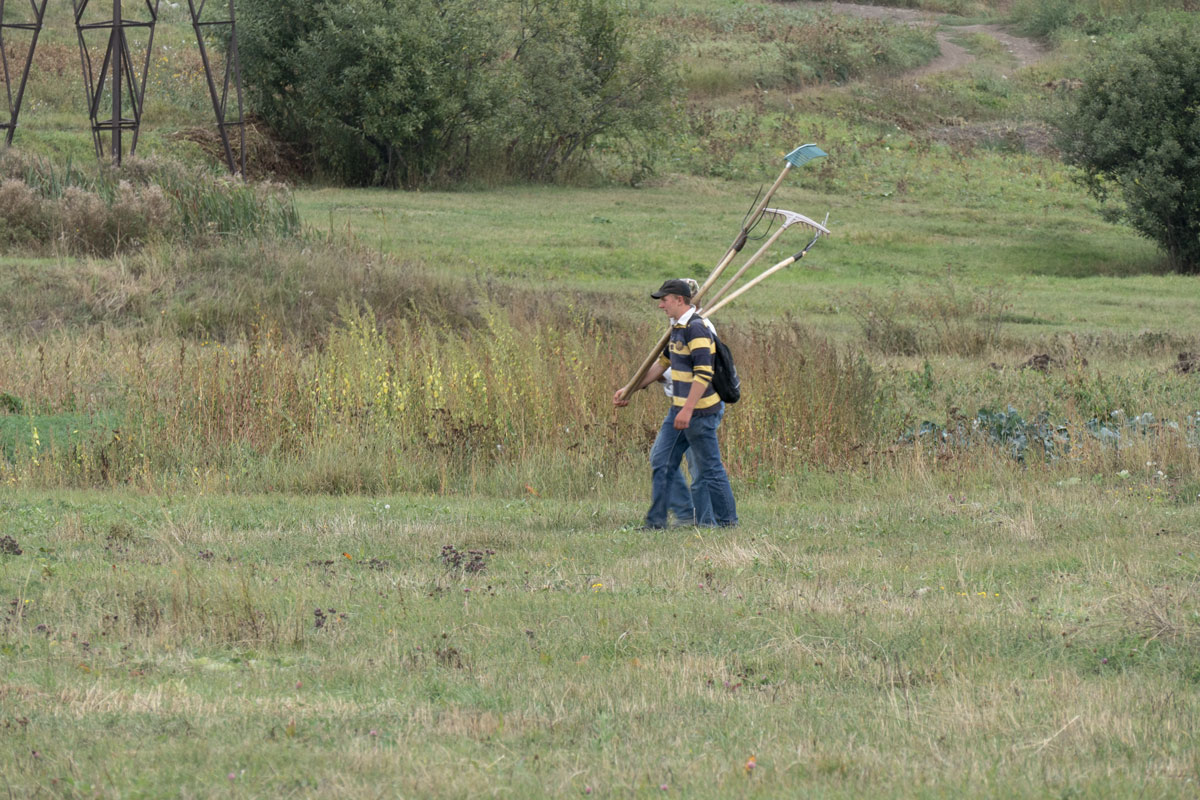
A man around forty years old, who had been resting by the truck, got up and slowly walked towards the peculiar machine. The seat from a tractor was installed on four wheels with some rusty screws attached to the back. The engine was sticking out from the front. Apparently, the cultivator was intended for weeding garden beds. The man approached the cultivator and sat down in the chair.
“Good day. What is your name?”
“Yakov.”
“Very nice to meet you. My name is Andrey, I’m from Russia.”
“Where exactly?”
“Krasnogorsk, it’s in the Moscow region.”
“I served there.”
“You served? You mean, in the army? And why did you come back?”
“It was compulsory service. It ended, so I came back.”
The man reached inside the engine and started the cultivator. His dog ran to the noise and started getting in my way.
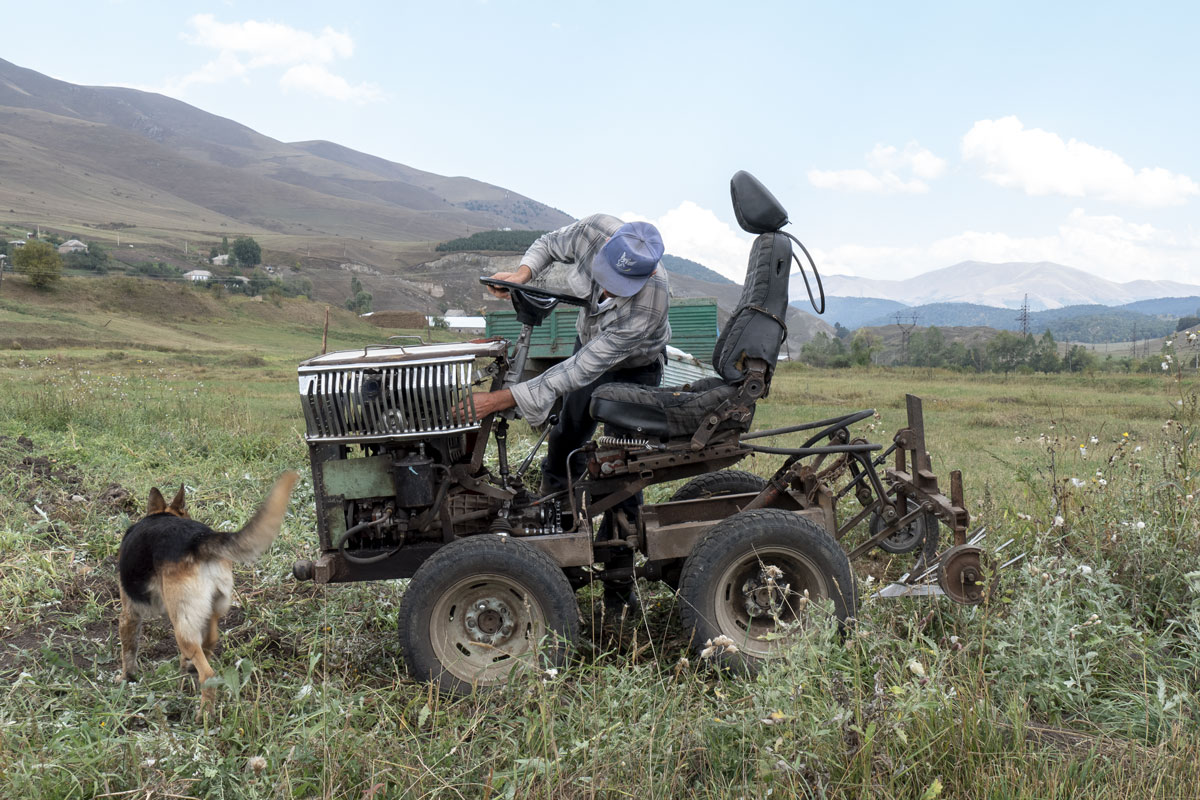
“Yakov, do you produce everything on your own here?”
“What do you mean?”
“Well, do you only grow potatoes or something else? Onions, cabbage?”
“Yes, both onions and cabbage.”
“Do you buy something from the store?”
“Well, maybe sugar, flour.”
“Yes, it’s easier to buy sugar. Do you have your own meat?”
“Well, we buy what we lack.”
“I see. Can I take a picture of you on the tractor?”
Yakov didn’t answer me, he just made an incomprehensible grunt and got ready to steer the cultivator. I thought he wouldn’t mind a photoshoot and prepared to take pictures of him. Suddenly, a distant shout came from behind: “Hey, Yakov, smile! You’ll be famous!”
Other men who were watching us from the field shouted this out.
Yakov became even more embarrassed by this. He didn’t look at the camera once and just drove the cultivator between the garden beds. The plow attached to the back entered the ground and began uprooting the potato tubers.
